Table of Contents
Few things in life are certain, but one thing is for sure: We know that we will encounter adversity at some time or another. This is truly what separates the wheat from the chaff. Anyone can thrive when conditions are right. But when the situation takes a turn for the worse do you fold under pressure or become something greater?
Not only does struggle help to separate the great from the rest of the pack, they also help people to hone their skills. Iron sharpens iron, as the saying goes, and there is no iron that sharpens more than hard times.
Struggle is what makes greatness. Hardship is what makes us great. However, it can be difficult to see and remember that in the moment.
What’s more, when one accepts the place of adversity in one’s life, one can begin preparing for it before it happens. Having a plan, and being amenable to changing that plan as new circumstances arise is crucial. Just as those who can rise to the challenge outlast those who cannot, so do those who can roll with the changes succeed over the more rigid and intransigent.
The following are some quotes both on the question of struggle as a necessary part of success.
Quotes About Adversity and How to Deal With Adversity
Frederick Douglass
“If there is no struggle, there is no progress.”
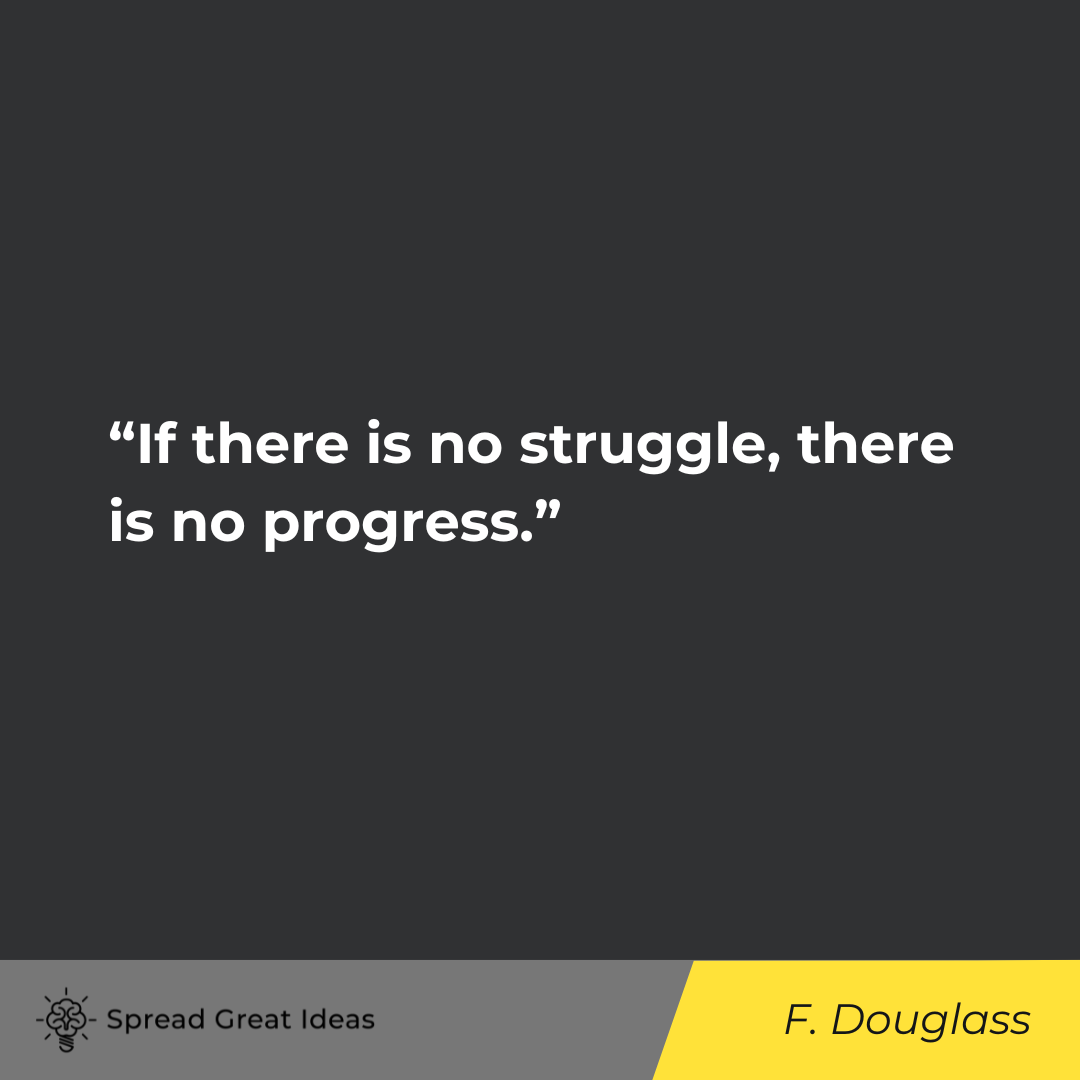
Frederick Douglass, an eminent abolitionist and advocate for civil rights, encapsulates the essence of growth and advancement in his famous quote: “If there is no struggle, there is no progress.” These words resonate deeply, affirming that challenges are not obstacles but catalysts for development. Douglass, who himself endured the horrors of slavery, understood that struggle breeds resilience and innovation. Progress, he implies, arises from confronting adversity with courage and determination. His quote serves as a timeless reminder that meaningful change requires the willingness to confront difficulties head-on, ultimately leading to the realization of aspirations and the betterment of society.
Carl Jung
“There are as many nights as days, and the one is just as long as the other in the year’s course. Even a happy life cannot be without a measure of darkness, and the word ‘happy’ would lose its meaning if it were not balanced by sadness.”
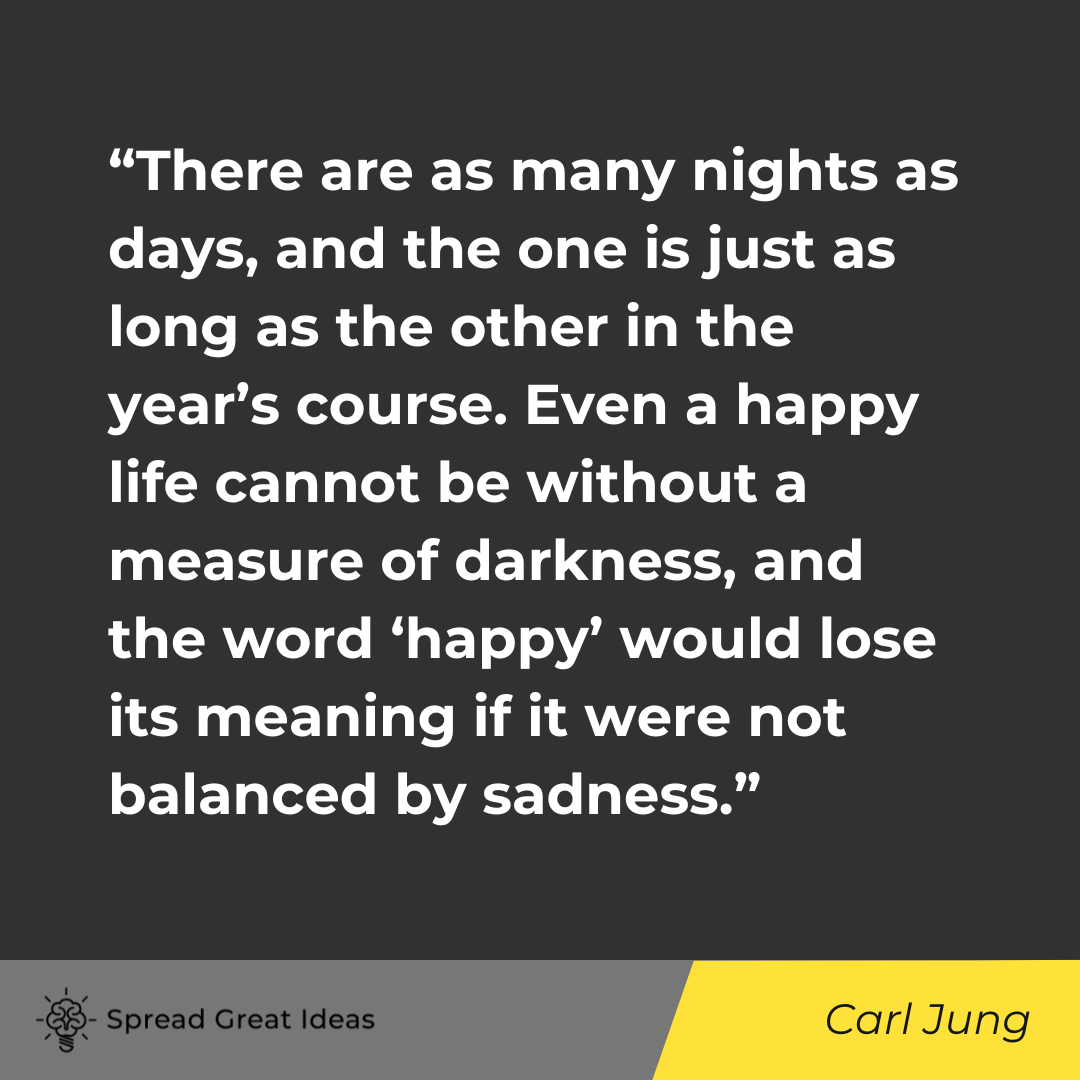
In this poignant quote, Carl Jung, the renowned Swiss psychiatrist and psychoanalyst, delves into the fundamental nature of human experience. He astutely observes the inherent balance between light and darkness, joy and sorrow, within the fabric of existence. Jung suggests that the richness of a fulfilled life stems from embracing both the highs and lows, as they lend depth and meaning to our journey. By acknowledging the inevitability of adversity alongside happiness, he illuminates the essence of resilience and the profound interconnectedness of emotions. Thus, Jung imparts a profound wisdom, urging us to appreciate life’s contrasts and find harmony within them.
Ryan Holiday
“It’s not just: How can I think this is not so bad? No, it is how to will yourself to see that this must be good—an opportunity to gain a new foothold, move forward, or go in a better direction. Not “be positive” but learn to be ceaselessly creative and opportunistic. Not: This is not so bad. But: I can make this good. Because it can be done. In fact, it has and is being done. Every day.”
– Ryan Holiday, The Obstacle Is the Way
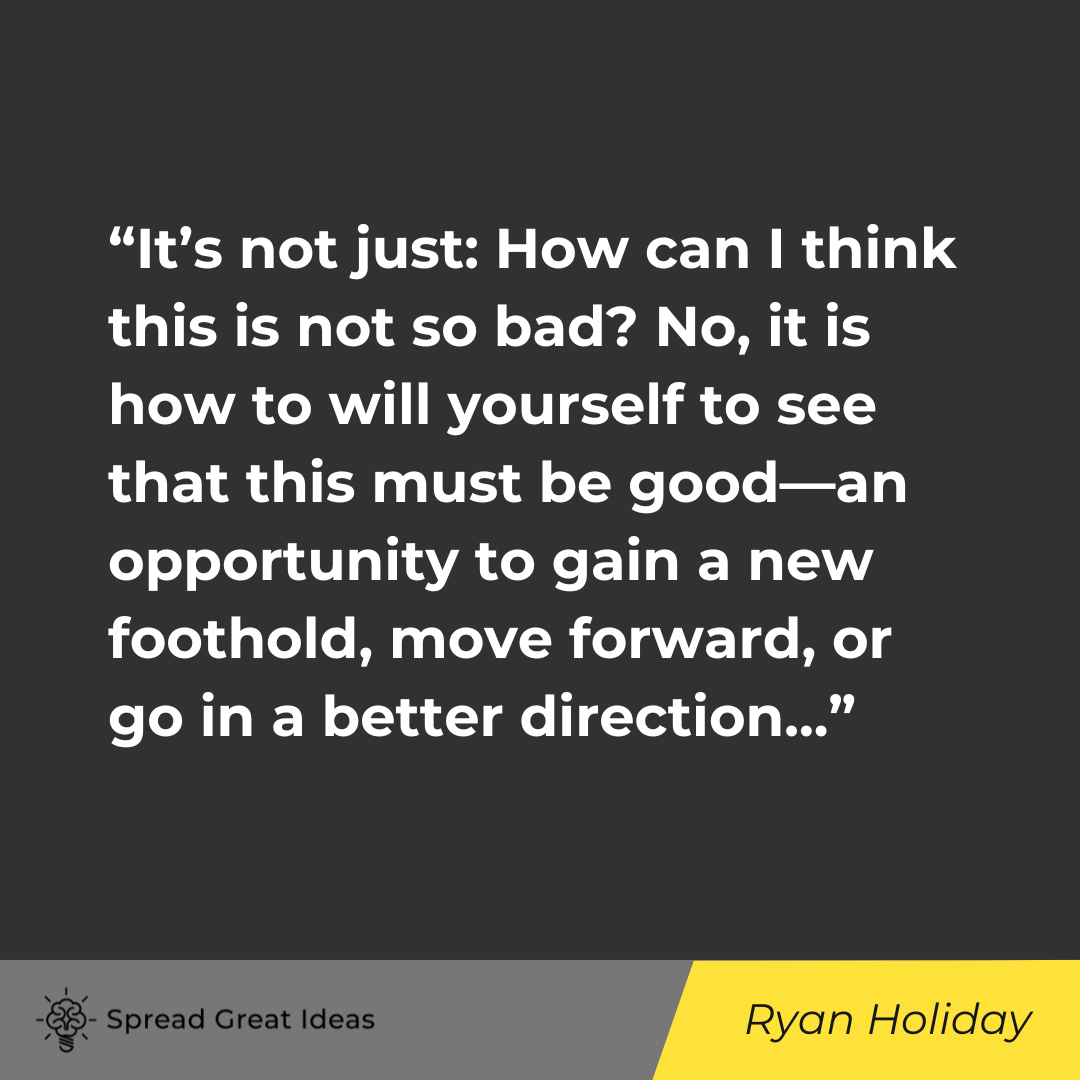
Ryan Holiday, in “The Obstacle Is the Way,” articulates a profound shift in mindset toward adversity. He challenges the notion of merely accepting hardships as “not so bad,” advocating instead for a proactive approach. Holiday prompts us to reframe difficulties as opportunities for growth and innovation. Rather than passively seeking positivity, he urges relentless creativity and opportunism. By fostering a mindset of perpetual adaptation, he suggests we can transform challenges into stepping stones for progress. Through his words, Holiday inspires us to embrace the inherent potential within obstacles, recognizing them as catalysts for personal and collective advancement.
Bernice Johnson Reagon
“Life’s challenges are not supposed to paralyze you; they’re supposed to help you discover who you are.”
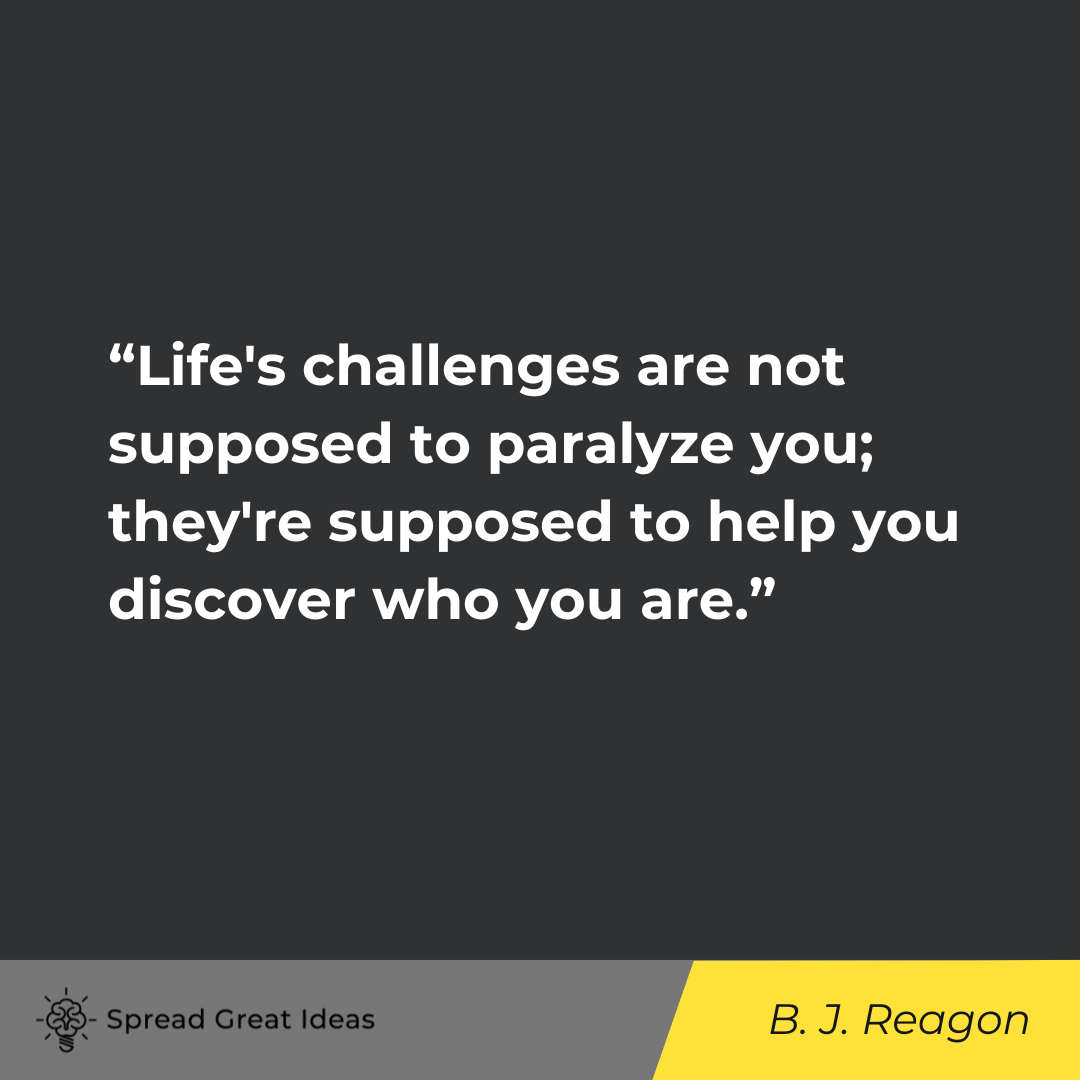
Bernice Johnson Reagon encapsulates the transformative power of life’s challenges in this insightful quote. She reframes adversity not as a barrier, but as a crucible for self-discovery. Reagon suggests that rather than succumbing to paralysis, we should embrace trials as opportunities for growth and introspection. Each obstacle, she implies, serves as a mirror reflecting our inner strengths and values, ultimately illuminating the essence of our identity. Through this perspective, Reagon empowers individuals to navigate challenges with resilience, viewing them as integral to the journey of self-realization and personal development.
Niccolò Machiavelli
“Entrepreneurs are simply those who understand that there is little difference between obstacle and opportunity and are able to turn both to their advantage.”
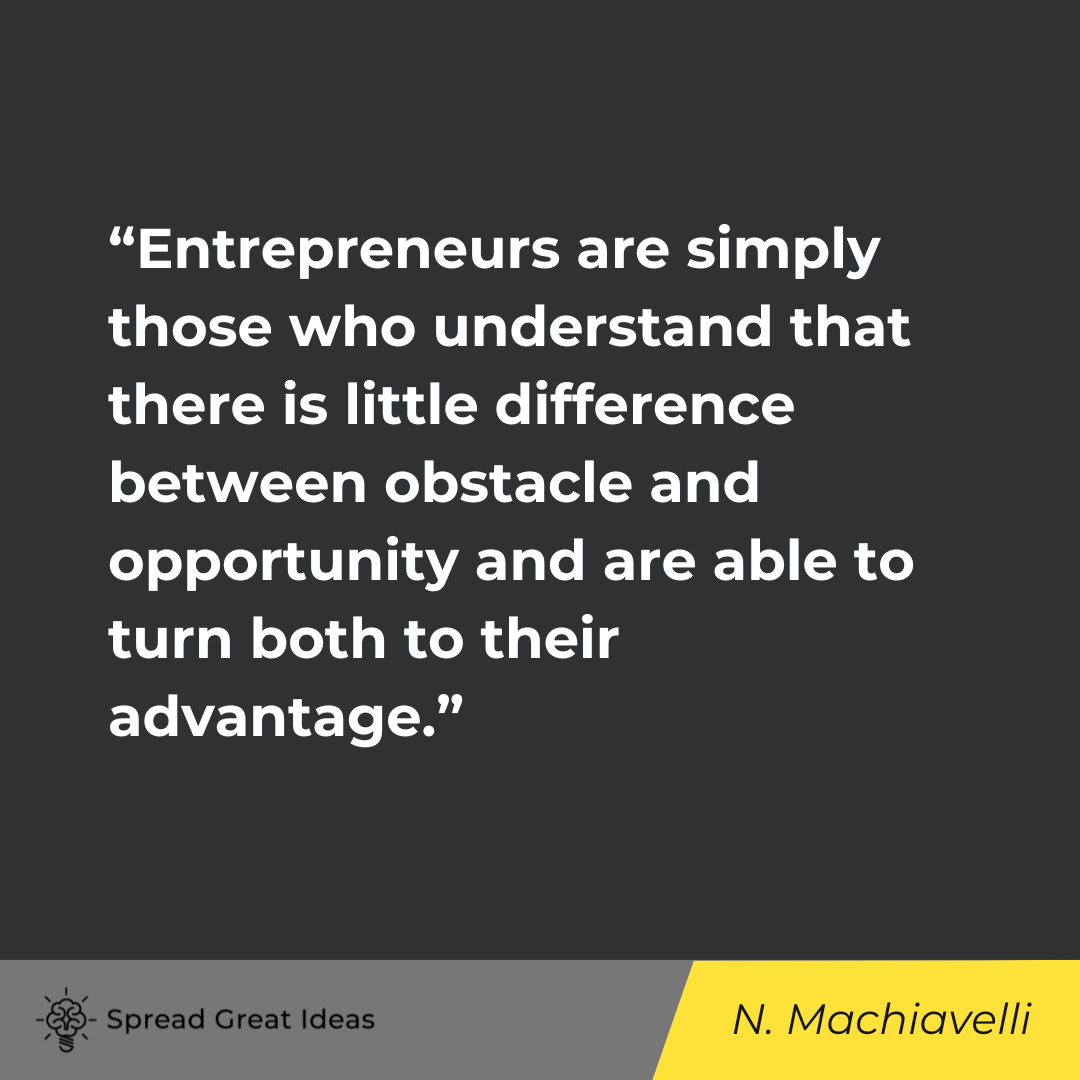
Niccolò Machiavelli’s quote epitomizes the entrepreneurial spirit as a fusion of strategic vision and adaptability. He posits that successful entrepreneurs perceive obstacles not as deterrents but as potential avenues for progress. By blurring the lines between adversity and opportunity, they wield challenges as tools for innovation and growth. Machiavelli implies that the distinction lies not in the obstacle itself, but in the entrepreneur’s ability to harness it to their advantage. This mindset fosters a culture of resilience and resourcefulness, enabling entrepreneurs to navigate uncertainty with confidence and transform setbacks into stepping stones toward success.
Franklin D. Roosevelt
“Smooth seas never made a skilled sailor.”
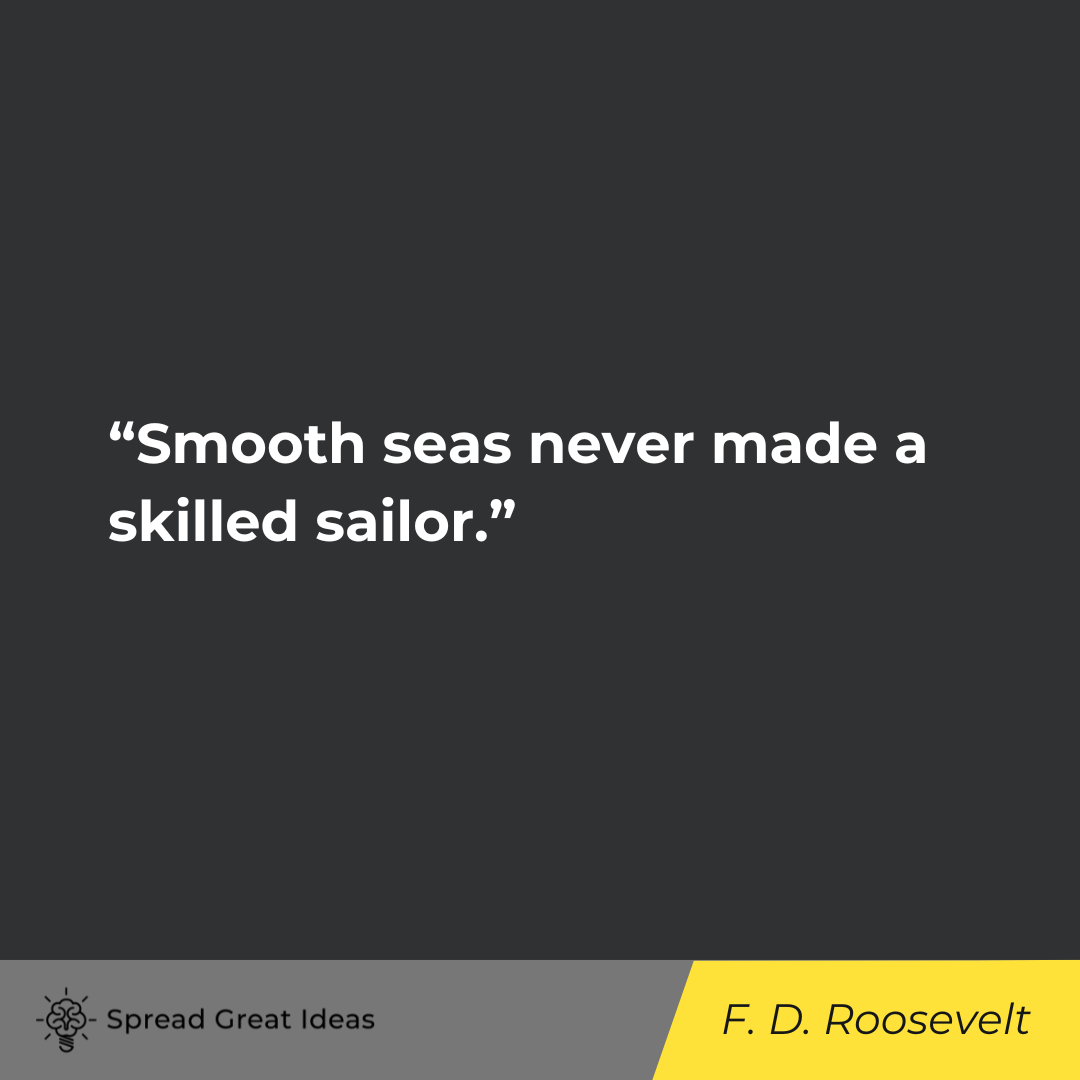
Franklin D. Roosevelt’s quote embodies the essence of resilience and proficiency in navigating life’s challenges. By likening the journey of life to sailing, he emphasizes that encountering rough waters is integral to honing one’s skills. Smooth seas, he suggests, offer little opportunity for growth or learning. In adversity lies the chance to develop resilience, adaptability, and expertise. Roosevelt’s words serve as a reminder that setbacks are not hindrances but catalysts for personal and professional advancement. Thus, embracing the turbulence of life equips individuals with the experience and wisdom needed to navigate future trials with confidence and competence.
Dutch proverb
“Tall trees catch a lot of wind.”

The Dutch proverb “Tall trees catch a lot of wind” encapsulates a timeless wisdom about the nature of prominence and attention. Like towering trees that attract the force of the wind, individuals who stand out or hold positions of influence often face increased scrutiny or criticism. This proverb cautions against the pitfalls of visibility, reminding us that with prominence comes vulnerability. It serves as a gentle reminder to exercise humility and resilience in the face of adversity, recognizing that with great visibility also comes the need for steadfastness and fortitude to weather the storms of life.
Helen Keller
“A bend in the road is not the end of the road…Unless you fail to make the turn.”
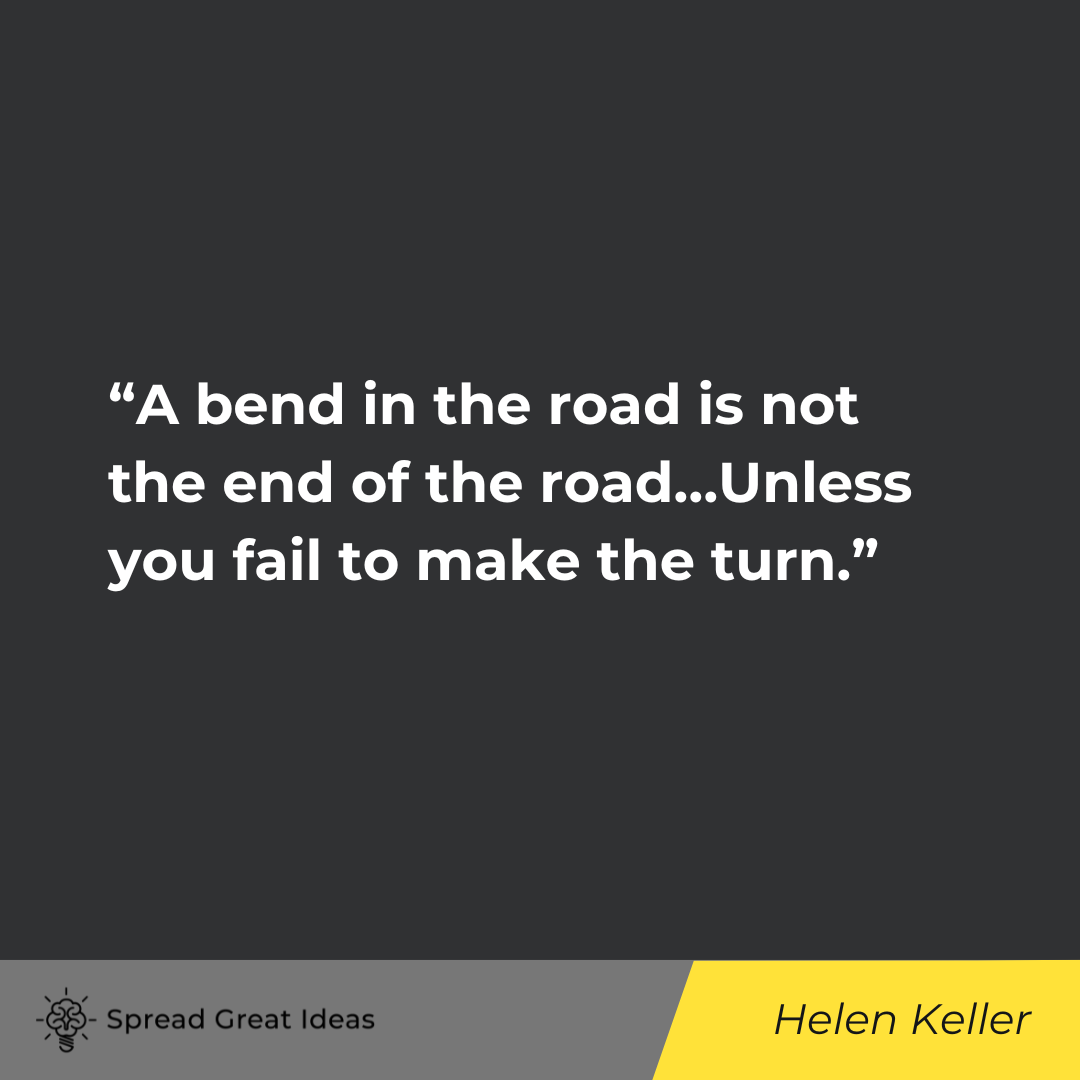
Helen Keller’s profound insight in “A bend in the road is not the end of the road…Unless you fail to make the turn” encapsulates the essence of resilience and adaptability in facing life’s challenges. She underscores that setbacks and obstacles are not definitive endpoints but merely points of transition. The metaphorical bend signifies change and uncertainty, yet it also presents an opportunity for growth and redirection. Keller’s quote serves as a poignant reminder that while the road may twist and turn, it is our ability to navigate and embrace these changes that determines our journey’s continuity and ultimate fulfillment.
Cus D’Amato
“Boxing is a sport of self-control. You must understand fear so you can manipulate it. Fear is like fire. You can make it work for you: it can warm you in the winter, cook your food when you’re hungry, give you light when you are in the dark, and produce energy. Let it go out of control and it can hurt you, even kill you… Fear is a friend of exceptional people.“
– Cus D’Amato, American boxing manager and trainer who handled the careers of Floyd Patterson, Mike Tyson, and José Torres, all of whom were inducted to the International Boxing Hall of Fame.

Cus D’Amato, the legendary boxing manager and trainer, delves into the psychology of fear in this profound quote. He depicts fear not as a hindrance, but as a potent force that can be harnessed for personal growth and success. D’Amato employs the analogy of fire to illustrate fear’s dual nature: when understood and controlled, it becomes a valuable ally, empowering individuals to overcome challenges and achieve greatness. However, left unchecked, fear can wreak havoc and lead to downfall. D’Amato’s words resonate beyond the boxing ring, imparting timeless wisdom about mastering one’s emotions and leveraging adversity as a catalyst for excellence.
Peter Thiel
“Entrepreneurship: you put one dumb foot in front of the other while the world throws bricks at your head.”

In this succinct yet powerful quote, entrepreneur and investor Peter Thiel encapsulates the essence of entrepreneurship as a journey fraught with challenges. He employs vivid imagery of putting one foot in front of the other while enduring the relentless barrage of obstacles represented by bricks hurled by the world. Thiel’s words capture the resilience and determination required to navigate the tumultuous path of entrepreneurship. Despite the adversities faced, he implies that progress is made through persistence and unwavering commitment, emphasizing the grit and fortitude necessary to overcome obstacles and ultimately achieve success in the face of adversity.
Alexander McQueen
“I think there is beauty in everything. What ‘normal’ people perceive as ugly, I can usually see something of beauty in it.“

In this profound statement, fashion icon Alexander McQueen unveils a unique perspective on beauty and perception. He challenges conventional norms by suggesting that beauty is not confined to traditional standards but rather exists in every facet of life. McQueen’s keen eye discerns beauty where others may see only ugliness, highlighting the power of perspective and the richness of diversity. His words inspire a shift in mindset, urging individuals to embrace a more inclusive and appreciative view of the world. Through his insight, McQueen encourages us to seek beauty not only in the expected but also in the unexpected, fostering a deeper appreciation for the complexities of existence.
Dire Straits
“Sometimes you’re the windshield; sometimes you’re the bug.”
– Dire Straits, The Bug

Dire Straits’ lyric from “The Bug” encapsulates life’s unpredictable nature. The metaphor of being either the windshield or the bug illustrates the highs and lows we encounter. At times, we’re empowered, like the windshield, overcoming obstacles and moving forward unscathed. Other times, we’re vulnerable, like the bug, facing challenges that leave us feeling crushed or defeated. This candid reflection on life’s fluctuations reminds us of our vulnerability and resilience. It prompts acceptance of both our triumphs and setbacks, fostering a balanced perspective that enables us to navigate life’s uncertainties with grace and fortitude.
American proverb
“God won’t give you more than you can handle.”

The American proverb “God won’t give you more than you can handle” reflects a belief in divine providence and human resilience. It offers solace during times of adversity, suggesting that challenges are presented with careful consideration of one’s abilities to endure and overcome. This notion provides comfort and reassurance, encouraging individuals to confront life’s trials with faith and strength. While acknowledging the difficulties one may face, the proverb instills hope, reminding us of our capacity for resilience and the belief that we possess the inner resources necessary to navigate even the most daunting of circumstances.
Cormac McCarthy
“Scars have the strange power to remind us that our past is real.”
– Cormac McCarthy, All the Pretty Horses
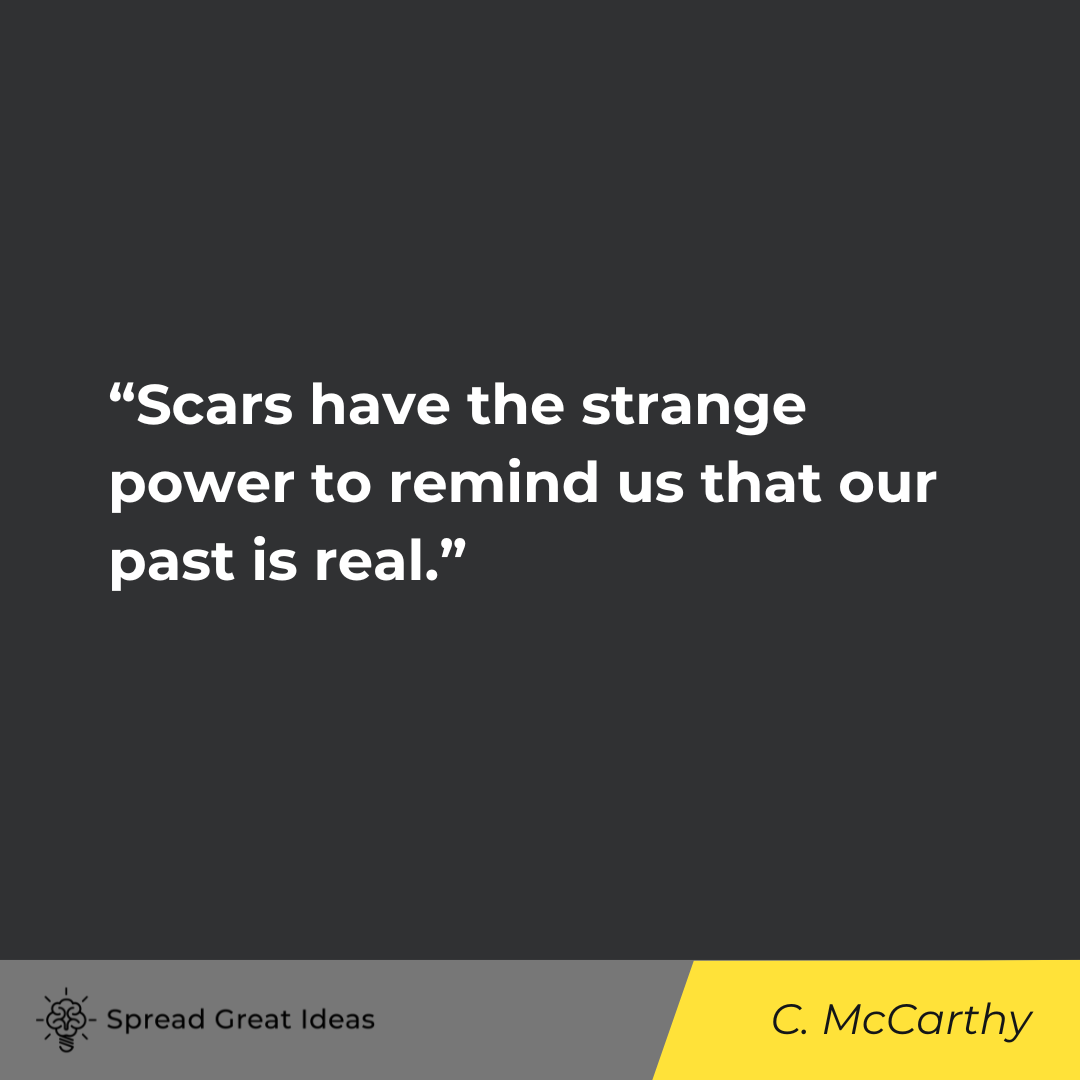
In “All the Pretty Horses,” Cormac McCarthy captures the profound significance of scars as tangible reminders of our lived experiences. He delves into the paradoxical nature of scars, which serve as enduring markers of past wounds yet also bear testimony to resilience and survival. McCarthy suggests that these physical manifestations carry a weight of authenticity, grounding us in the reality of our personal histories. Through his evocative prose, he highlights the transformative power of embracing our scars, allowing them to shape and inform our present selves while serving as poignant reminders of the challenges we have overcome.
Aristotle
“Learning is an ornament in prosperity, a refuge in adversity, and a provision in old age.”
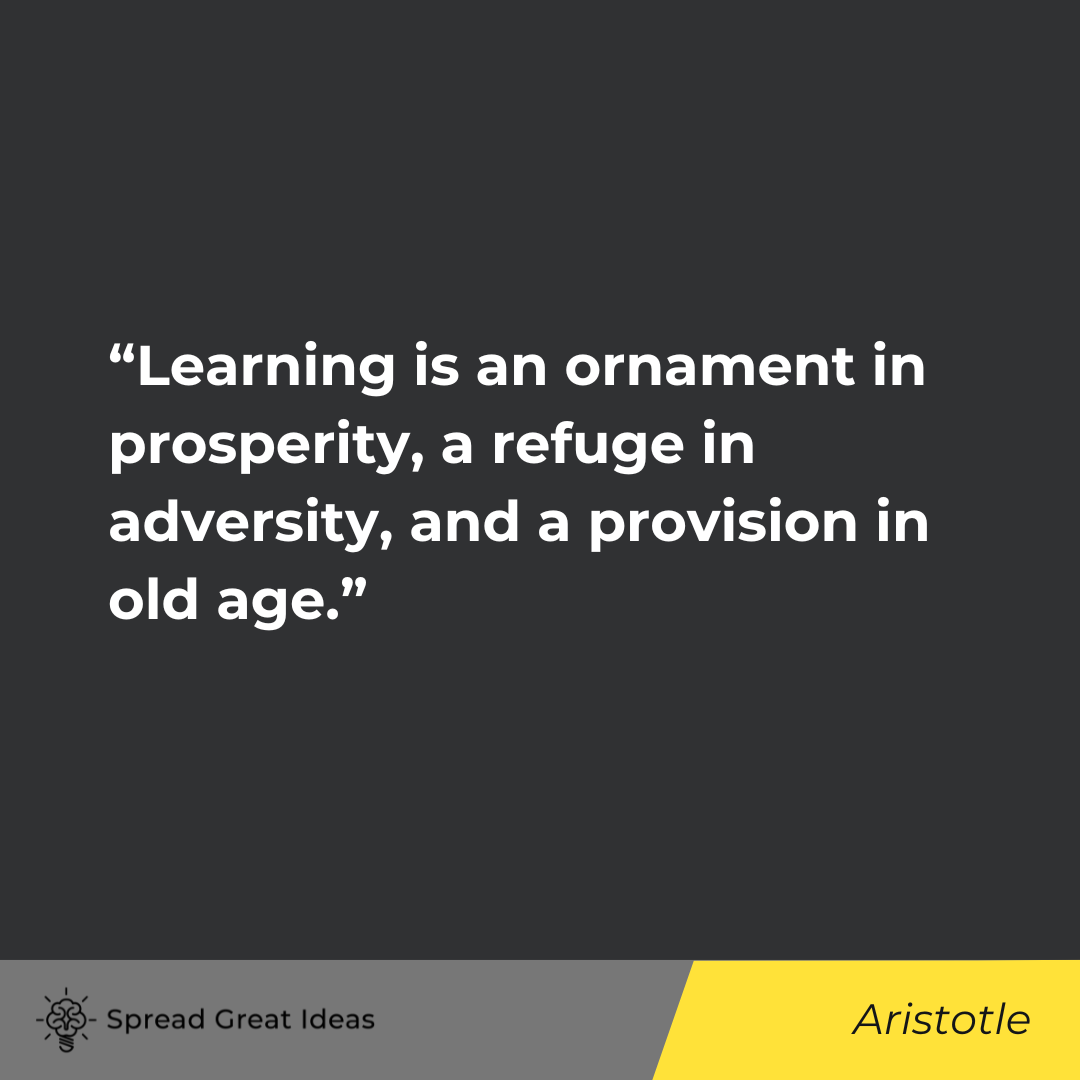
Aristotle’s timeless wisdom encapsulated in “Learning is an ornament in prosperity, a refuge in adversity, and a provision in old age” underscores the enduring value of education across the spectrum of human experience. In times of prosperity, learning serves as a source of enrichment and refinement, enhancing one’s life and character. Amid adversity, it becomes a sanctuary, offering solace and guidance through challenging times. As age advances, learning remains a vital resource, providing sustenance for continued growth and fulfillment. Aristotle’s quote resonates with the eternal truth that knowledge is not only a lifelong pursuit but also a cornerstone of resilience and well-being in every stage of life.
Aristotle
“The beauty of the soul shines out when a man bears with composure one heavy mischance after another, not because he does not feel them, but because he is a man of high and heroic temper.”
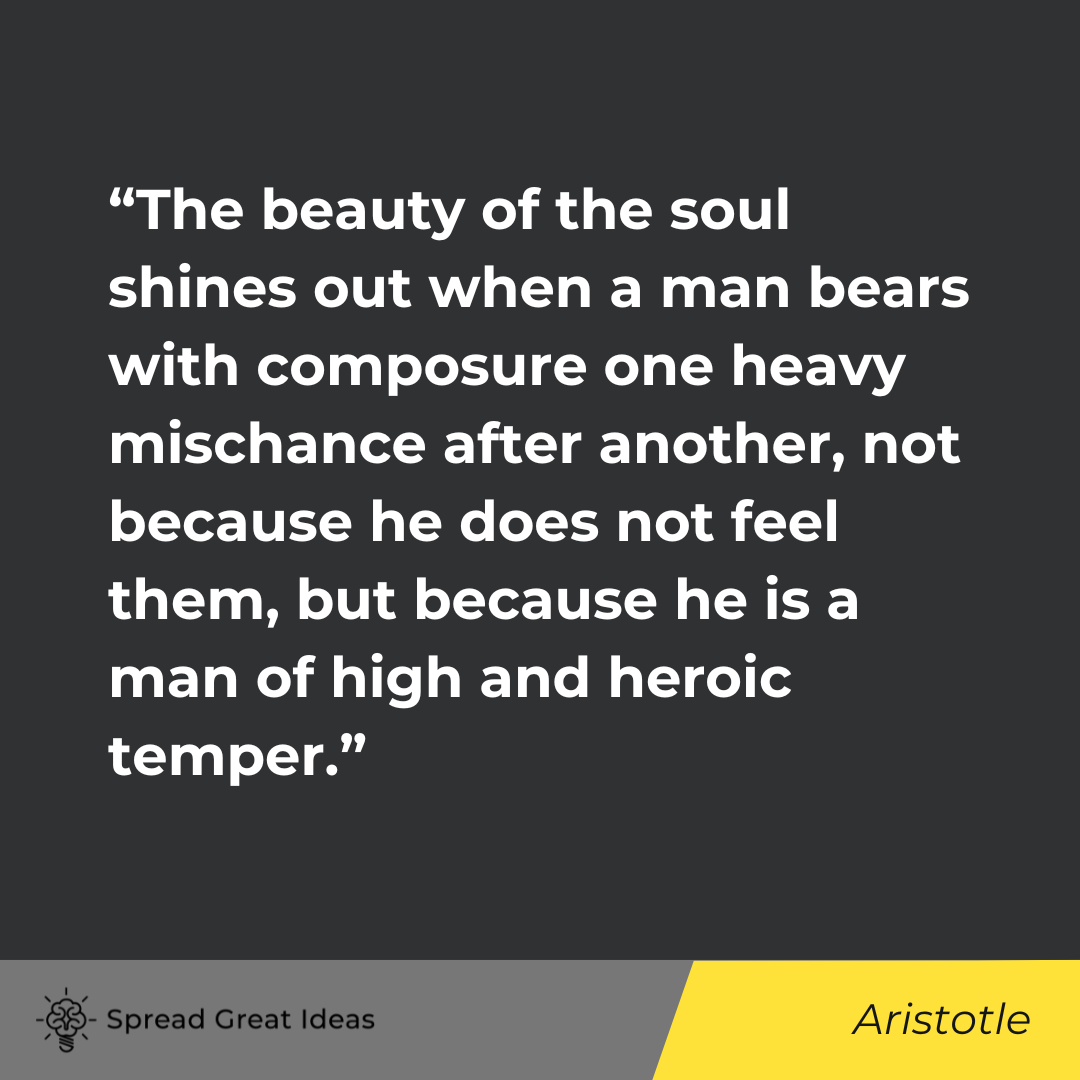
Aristotle’s profound insight in “The beauty of the soul shines out when a man bears with composure one heavy mischance after another, not because he does not feel them, but because he is a man of high and heroic temper” illuminates the essence of resilience and character. He extols the inner strength and nobility exhibited by those who face adversity with grace and fortitude. Despite experiencing hardship, such individuals rise above their circumstances, demonstrating courage and dignity in the face of challenges. Aristotle suggests that it is through such trials that the true beauty of the soul is revealed, showcasing the indomitable spirit of those who embody high ideals and virtuous principles.
Joseph Campbell
“Why is it that on almost every culture on earth you can find stories of virgins giving birth to heroes who die and are resurrected? Osiris, Tammuz, Adonis, Jesus of Nazareth. Parallel stories of suffering, sacrifice, and redemption.“
– Joseph Campbell, Bill Moyers Season 1, Episode 2: Joseph Campbell and the Power of Myth – “The Message of the Myth”
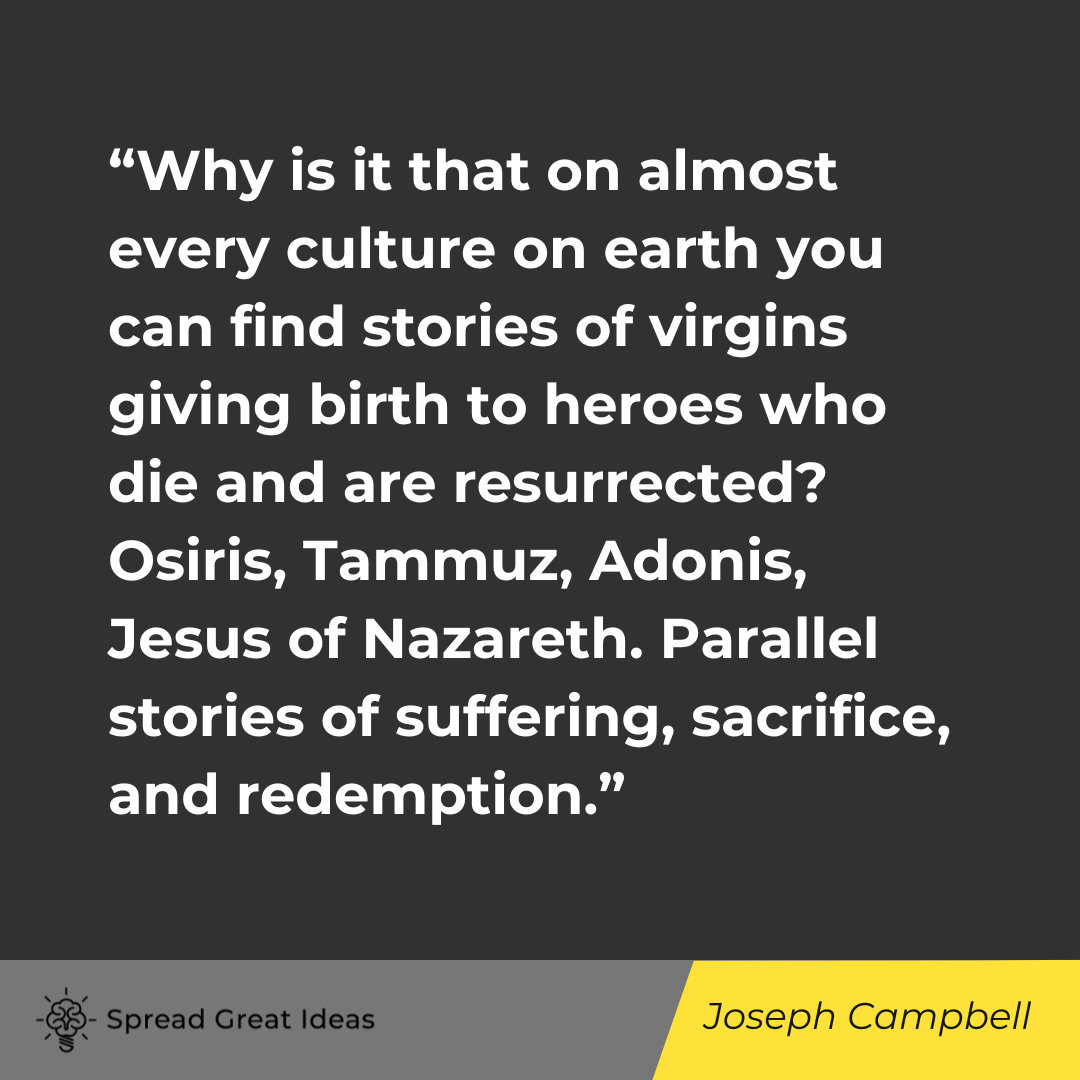
In this quote from “The Message of the Myth,” Joseph Campbell explores the universality of mythological narratives across diverse cultures. He highlights the recurring motif of virgin births, sacrificial deaths, and miraculous resurrections in mythologies worldwide, citing examples like Osiris, Tammuz, Adonis, and Jesus of Nazareth. Campbell suggests that these parallel stories embody profound themes of suffering, sacrifice, and redemption, resonating deeply with the human experience. Through myth, he contends, cultures express timeless truths about the human condition, offering narratives that transcend temporal and geographical boundaries, providing insight into our collective longing for meaning, transformation, and transcendence.
Joseph Campbell
“The hero is what’s worth writing about. Even in popular novels the main character is a hero or a heroin that is to say someone who has found or achieved or done something beyond the normal range of achievement and experience. A hero properly is someone who has given his or her life to something bigger than himself. Or to something other than himself.“
– Joseph Campbell, Bill Moyers Season 1, Episode 1: Joseph Campbell and the Power of Myth – “The Hero’s Adventure”
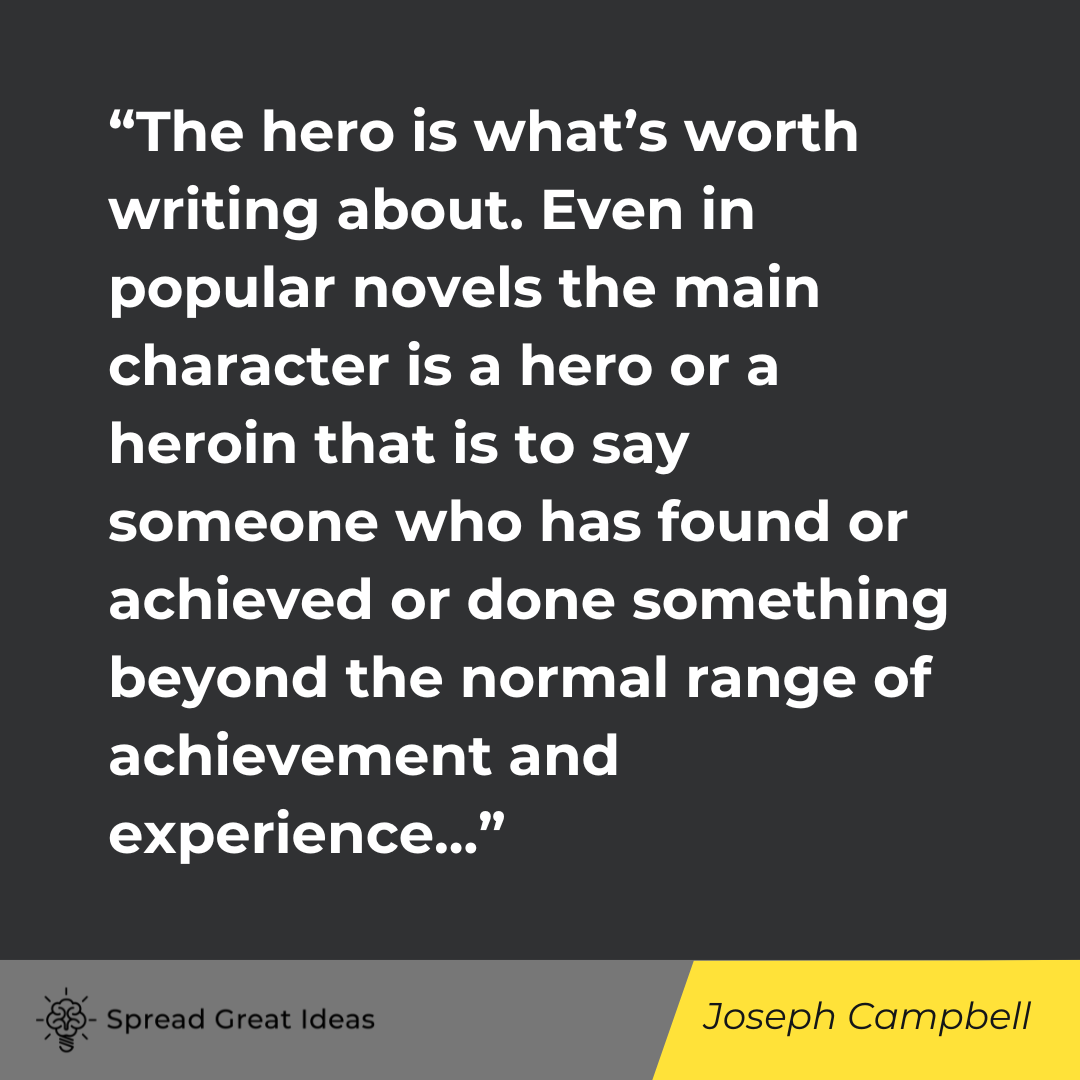
In “The Hero’s Adventure,” Joseph Campbell delves into the essence of heroism, emphasizing its central role in storytelling across cultures. He contends that heroes, whether in mythology or popular novels, embody extraordinary qualities or accomplishments beyond the ordinary. Campbell defines a hero as someone who dedicates their life to a cause greater than themselves, transcending personal interests for the betterment of others or a higher purpose. Through his insightful perspective, Campbell invites us to recognize the universal allure of heroic figures, whose journeys inspire us to pursue meaning, selflessness, and transformative experiences in our own lives.
Thomas Carlyle
“No pressure; no diamonds.“
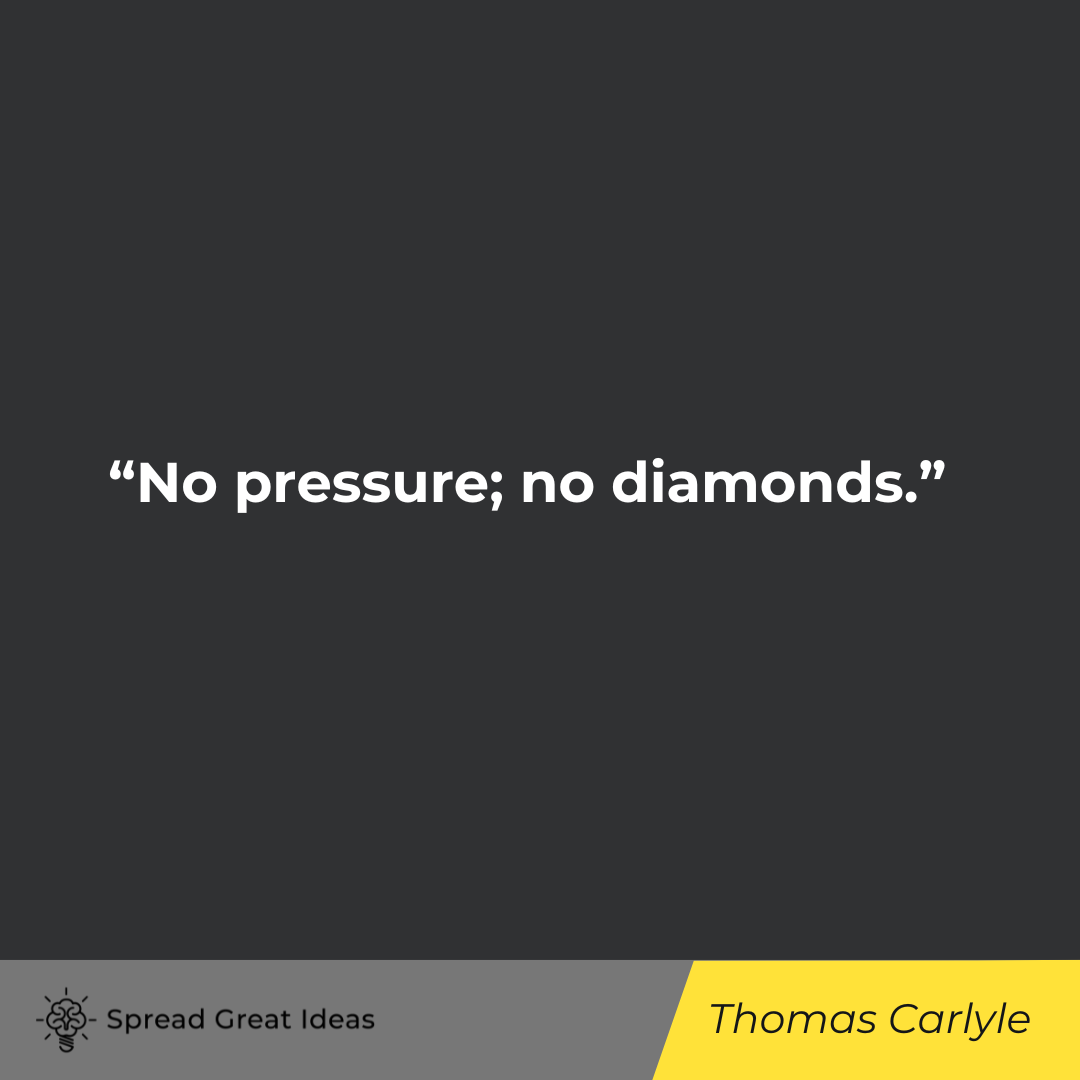
Thomas Carlyle’s succinct aphorism “No pressure; no diamonds” encapsulates a profound truth about the transformative power of adversity. By likening pressure to the geological forces that create diamonds, Carlyle suggests that challenges and hardships are essential catalysts for personal growth and achievement. Without the pressure of difficulties, individuals may never realize their full potential or uncover hidden strengths. This quote serves as a reminder that obstacles are not impediments but opportunities for resilience and innovation. Embracing pressure with courage and determination can lead to the refinement of character and the emergence of brilliance, much like the creation of a precious gem.
John A. Shedd
“A ship in harbor is safe, but that is not what ships are built for.“
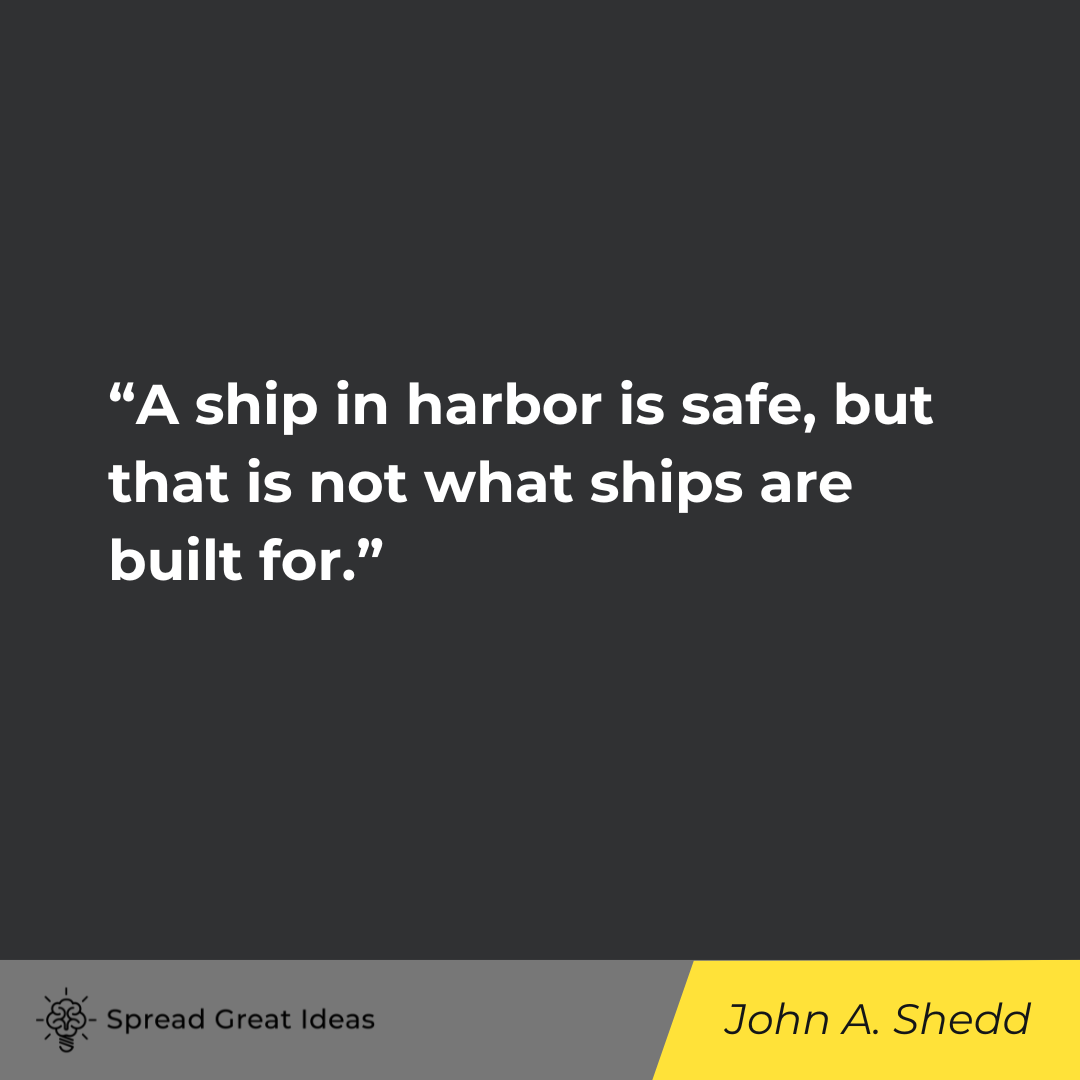
John A. Shedd’s timeless quote “A ship in harbor is safe, but that is not what ships are built for” speaks to the inherent tension between safety and adventure, comfort and growth. Shedd poetically suggests that while harbors offer security, they also confine vessels from their true purpose: to explore, conquer the vast expanse of the sea, and embrace the unknown. This quote serves as a metaphor for human existence, urging individuals to venture beyond their comfort zones, confront challenges, and pursue their aspirations courageously. Shedd’s words inspire a spirit of daring exploration, reminding us that true fulfillment lies in daring to sail into uncharted waters.
Douglas Malloch
“Good timber does not grow with ease, the stronger wind, the stronger trees.“
– Douglas Malloch, “Good Timber”
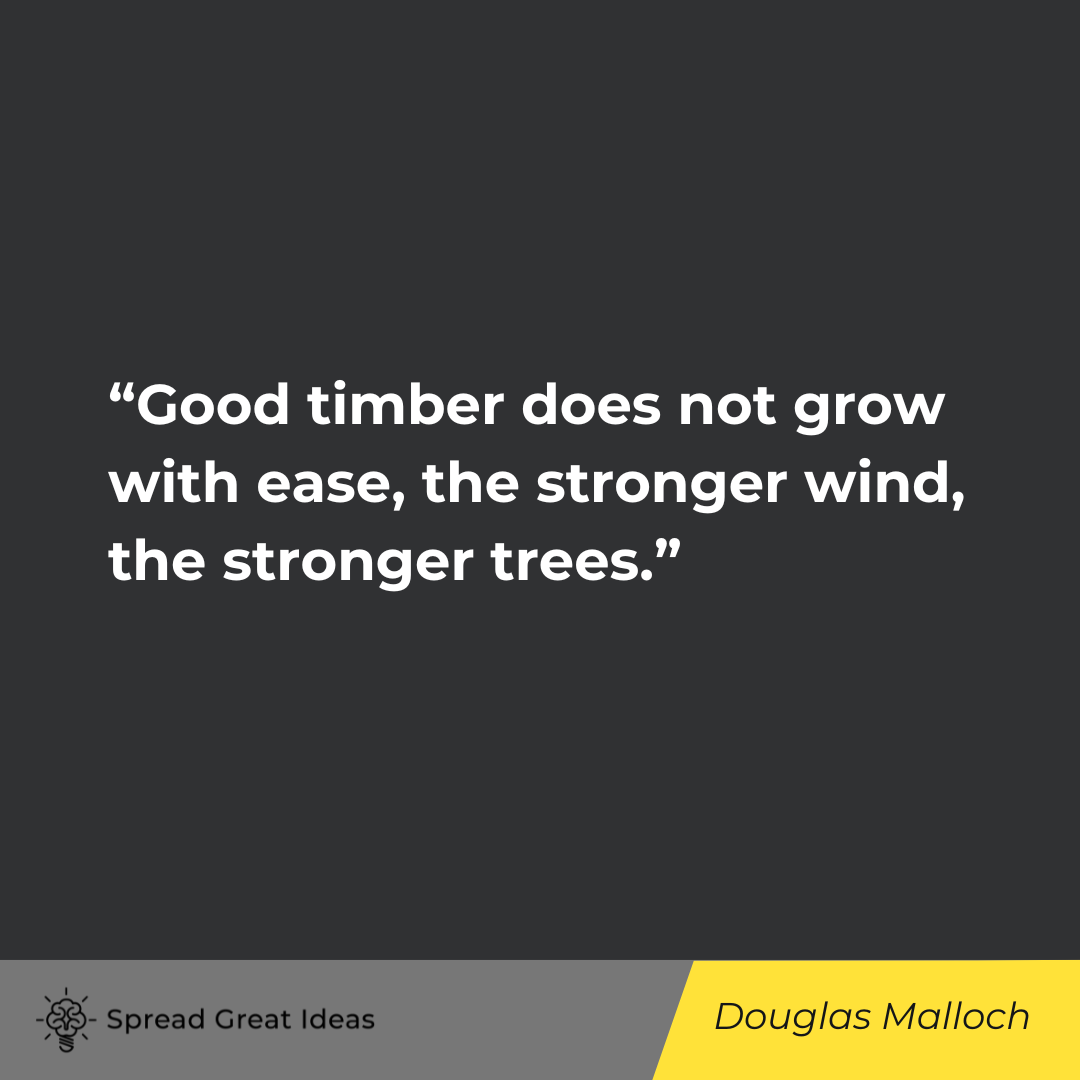
In Douglas Malloch’s poignant poem “Good Timber,” he poetically captures the essence of resilience and strength through the metaphor of trees. Malloch suggests that like trees, individuals of exceptional quality do not emerge without facing adversity. The challenges they encounter, symbolized by strong winds, serve to fortify their character and resilience. Through this perspective, Malloch reminds us that it is the trials and tribulations we face that shape us into our best selves. Just as sturdy timber withstands fierce winds, facing difficulties head-on allows us to grow stronger, resilient, and better equipped to weather life’s storms.
Thomas Paine
“The harder the conflict, the more glorious the triumph. What we obtain too cheap, we esteem too lightly; ’tis dearness only that gives everything its value. I love the man that can smile in trouble, that can gather strength from distress, and grow brave by reflection. ‘Tis the business of little minds to shrink; but he whose heart is firm, and whose conscience approves his conduct, will pursue his principles until death.”
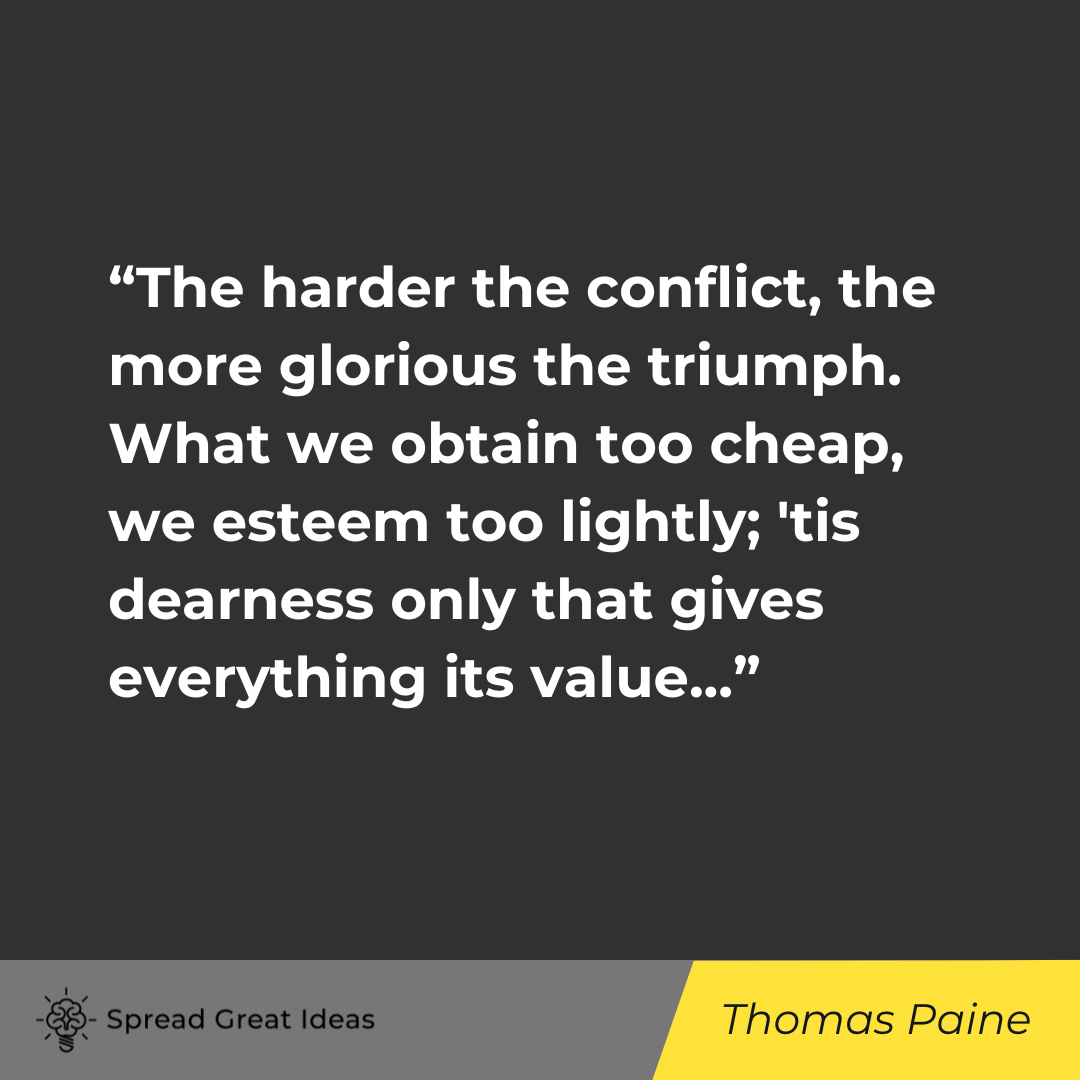
Thomas Paine’s timeless wisdom in this quote encapsulates the transformative power of adversity and the resilience of the human spirit. He asserts that triumph is most meaningful when it is hard-won, as challenges and conflicts provide opportunities for growth and reflection. Paine celebrates those who maintain their composure and strength in the face of trouble, recognizing that true courage lies in steadfastly adhering to one’s principles despite hardship. He contrasts the resilience of the strong-hearted with the timidity of those who shrink from challenges, emphasizing the enduring value of integrity and perseverance in the pursuit of noble ideals.
Thomas Paine
“These are the times that try men’s souls.”
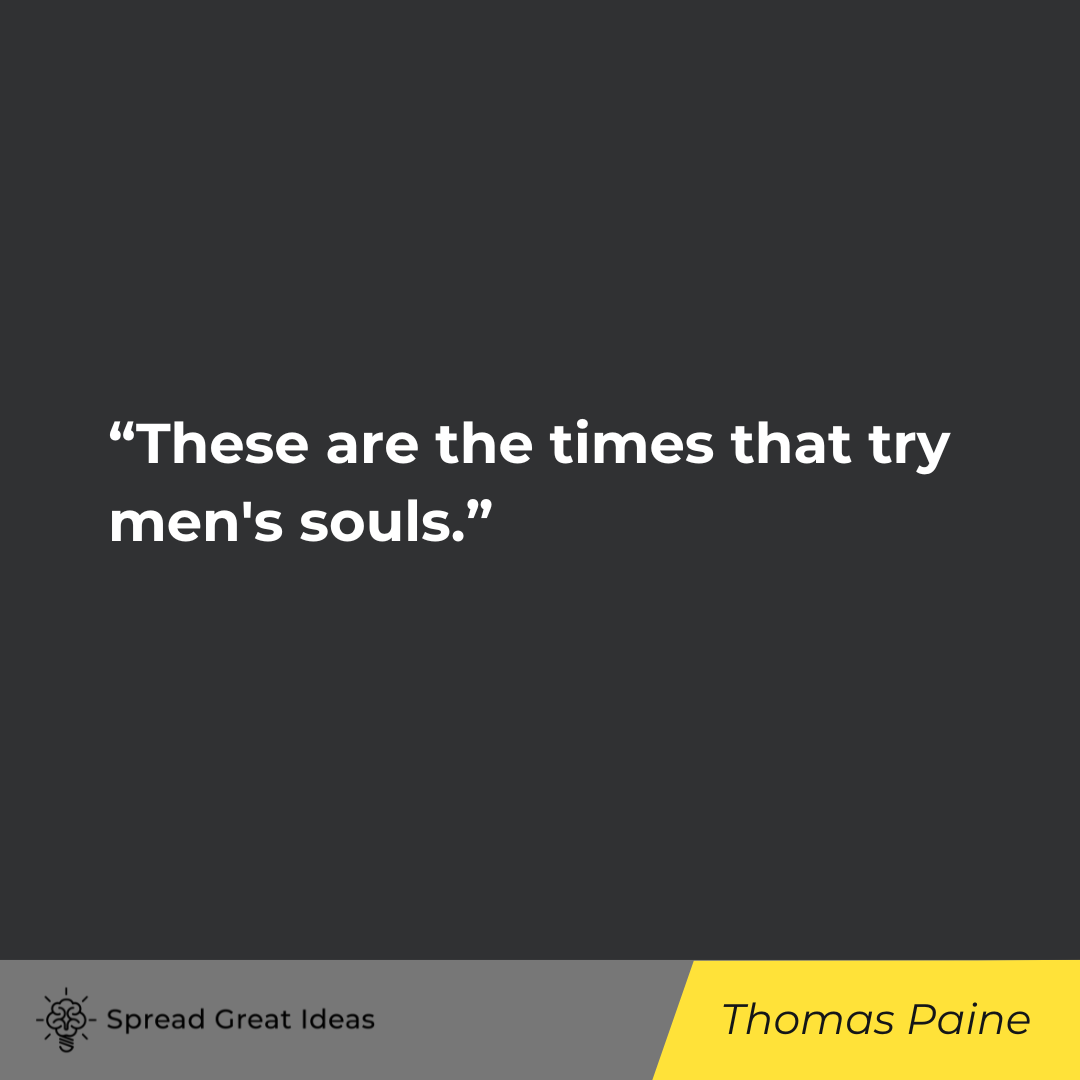
Thomas Paine’s powerful declaration, “These are the times that try men’s souls,” resonates through the ages as a rallying cry during moments of profound challenge and upheaval. Paine penned these words during the American Revolution, capturing the spirit of uncertainty and adversity faced by patriots fighting for independence. Beyond their historical context, the quote endures as a universal reminder of the trials humanity encounters in times of crisis. It speaks to the resilience and fortitude required to confront adversity with courage and determination. Paine’s words continue to inspire individuals to persevere and uphold their principles amidst the most testing of circumstances.
Seneca
“Difficulties strengthen the mind, as labor does the body.”
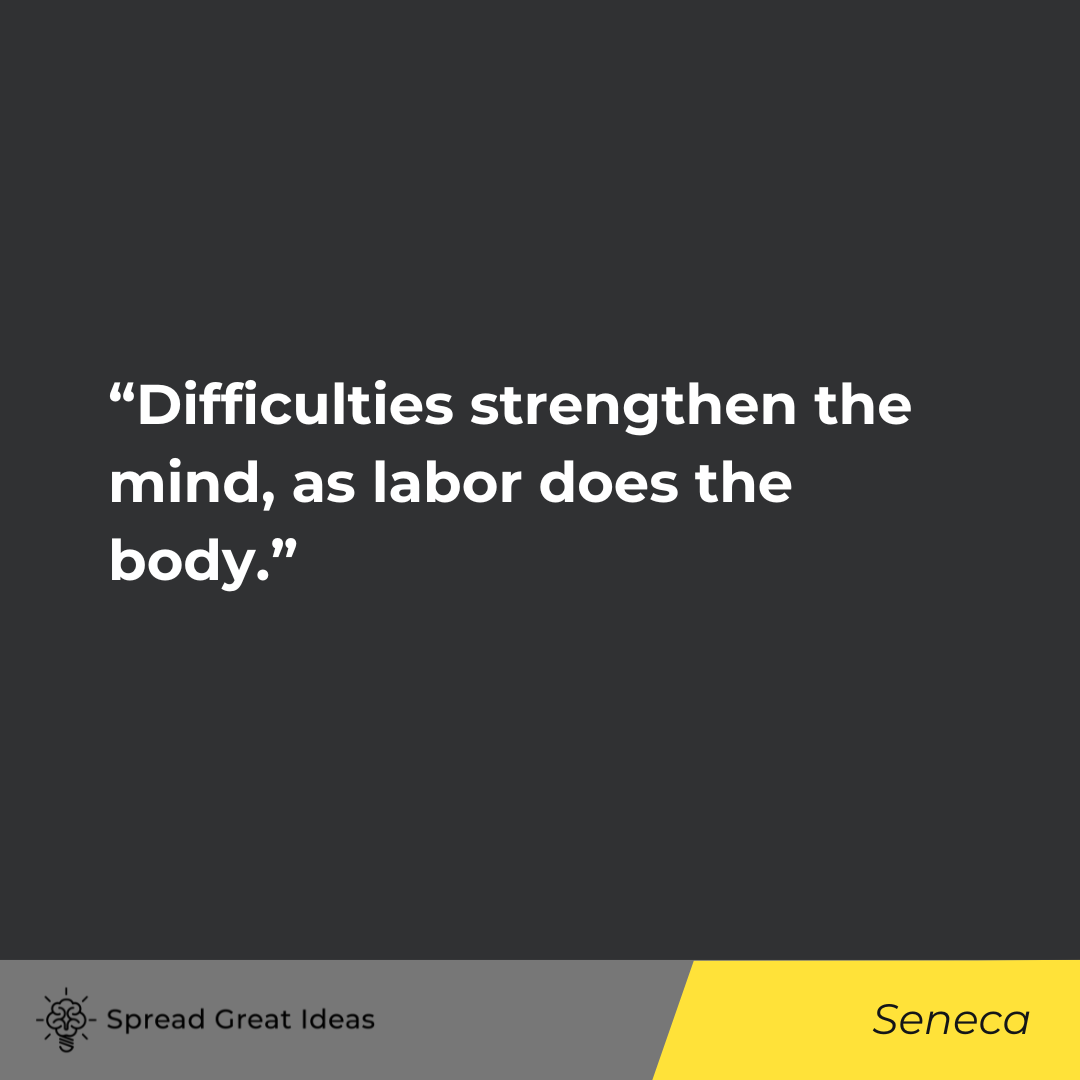
Seneca, the Stoic philosopher, offers timeless wisdom in his assertion that “Difficulties strengthen the mind, as labor does the body.” He emphasizes the transformative power of challenges, likening them to physical exercise that builds strength and resilience. Seneca suggests that just as physical labor strengthens the body, facing difficulties hones the faculties of the mind, fostering mental toughness and fortitude. Through this perspective, he encourages embracing obstacles as opportunities for growth and self-improvement. Seneca’s words inspire individuals to confront adversity with courage and determination, recognizing that it is through overcoming challenges that we develop the inner strength needed to thrive in life’s journey.
Henry David Thoreau
“However mean your life is, meet it and live it; do not shun it and call it hard names. It is not so bad as you are. It looks poorest when you are richest. The fault-finder will find faults even in paradise. Love your life, poor as it is. You may perhaps have some pleasant, thrilling, glorious hours, even in a poorhouse. The setting sun is reflected from the windows of the almshouse as brightly as from the rich man’s abode; the snow melts before its door as early in the spring. I do not see but a quiet mind may live as contentedly there, and have as cheering thoughts, as in a palace.”

In this excerpt from “Walden,” Henry David Thoreau reflects on the intrinsic value of life and the importance of embracing it fully, regardless of external circumstances. Thoreau urges against labeling one’s life as harsh or unworthy, asserting that even in the direst of situations, moments of joy and beauty can be found. He challenges the notion that material wealth equates to happiness, suggesting that contentment and fulfillment stem from within, independent of external wealth or status. Thoreau’s words encourage a shift in perspective, advocating for gratitude and acceptance of life’s inherent richness, even amidst adversity or simplicity.
Rose Mary Walls’ character
“Why that one? The wind has been beating that tree down since the day it was born. But it refuses to fall. It’s the struggle that gives it its beauty.“
– Rose Mary Walls’ character, The Glass Castle
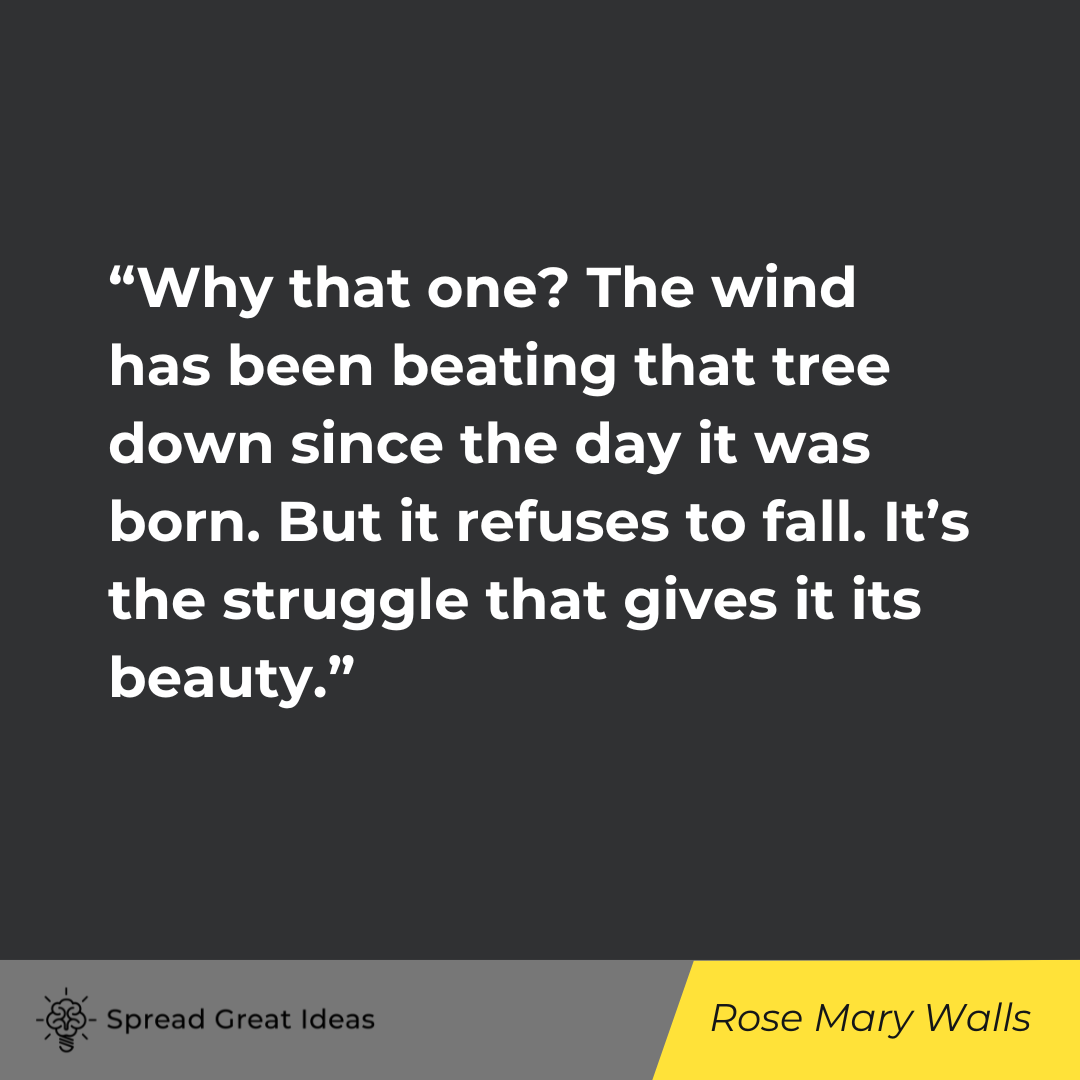
In Rose Mary Walls’ character’s poignant observation from “The Glass Castle,” she reflects on the resilience and beauty of a tree weathering the relentless force of the wind. Through this metaphor, she highlights the transformative power of struggle and adversity. Despite facing constant challenges, the tree stands tall, its endurance lending it a unique and enduring beauty. Rose Mary’s words serve as a reminder that it is through adversity that strength is forged, and it is in the struggle that true beauty emerges. This quote inspires resilience and appreciation for the inherent grace found in overcoming life’s trials.
Mary Tyler Moore
“You can’t be brave if you’ve only had wonderful things happen to you.”

Mary Tyler Moore’s quote encapsulates the essence of bravery as forged through adversity. She suggests that true courage emerges from facing challenges and overcoming difficulties. Moore implies that a life devoid of hardship may lack the opportunity for bravery to manifest, as adversity provides the crucible in which courage is tempered and refined. By acknowledging the necessity of struggle in the development of bravery, Moore’s words inspire individuals to embrace challenges as opportunities for growth and resilience. Through this perspective, she underscores the transformative power of adversity in shaping character and fostering inner strength.
Edgar Allan Poe
“Never to suffer would never to have been blessed.”
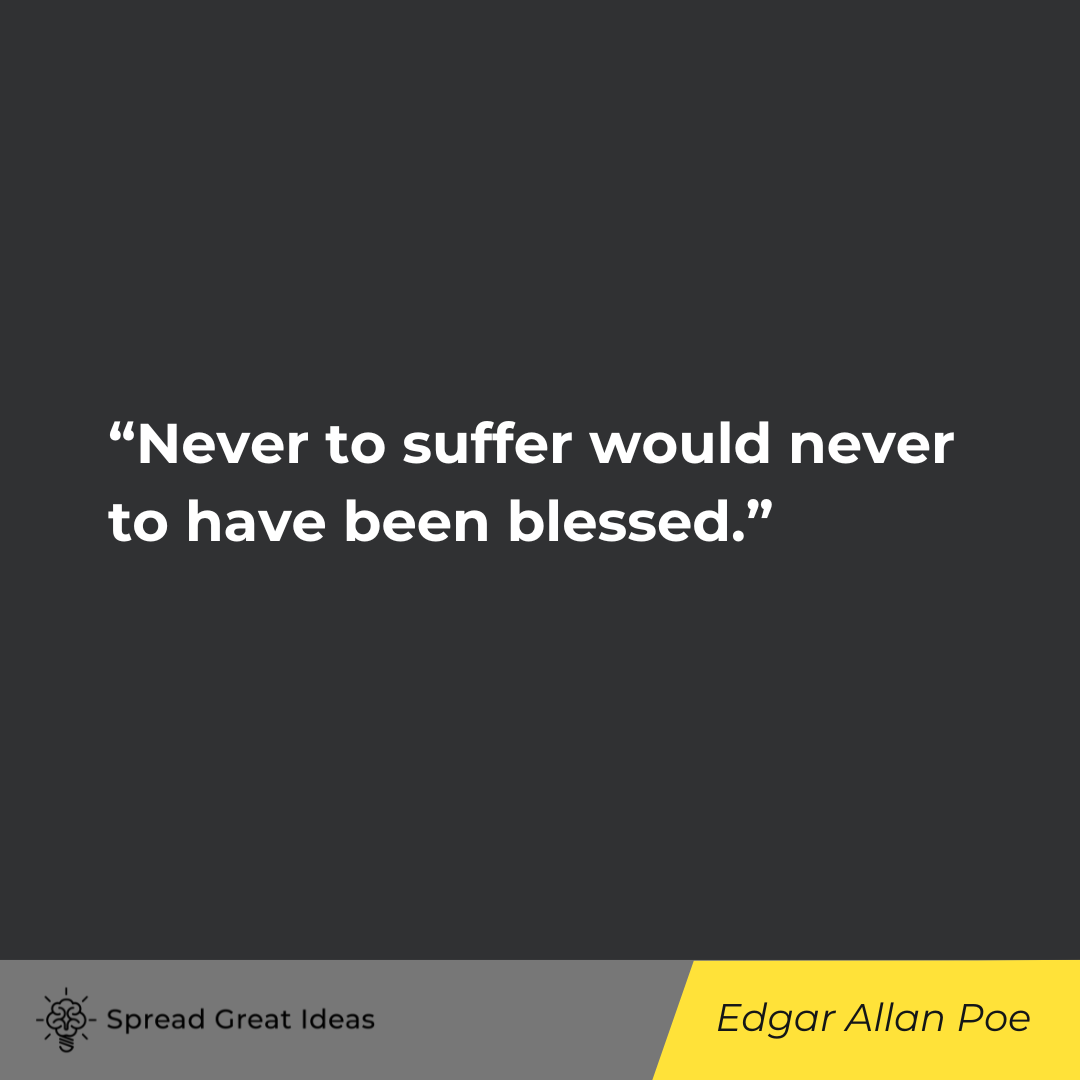
In this profound quote by Edgar Allan Poe, the renowned writer delves into the intricate relationship between suffering and blessing. Poe suggests that the experience of suffering is an intrinsic aspect of the human condition, inseparable from the blessings and joys of life. He implies that without experiencing hardship and pain, one cannot fully appreciate or recognize the blessings and moments of happiness. Poe’s words resonate with the idea that adversity deepens our capacity for empathy, resilience, and gratitude, ultimately enriching the human experience and imbuing life with profound meaning and significance.
Vince Lombardi
“The real glory is being knocked to your knees and then coming back. That’s real glory. That’s the essence of it.”
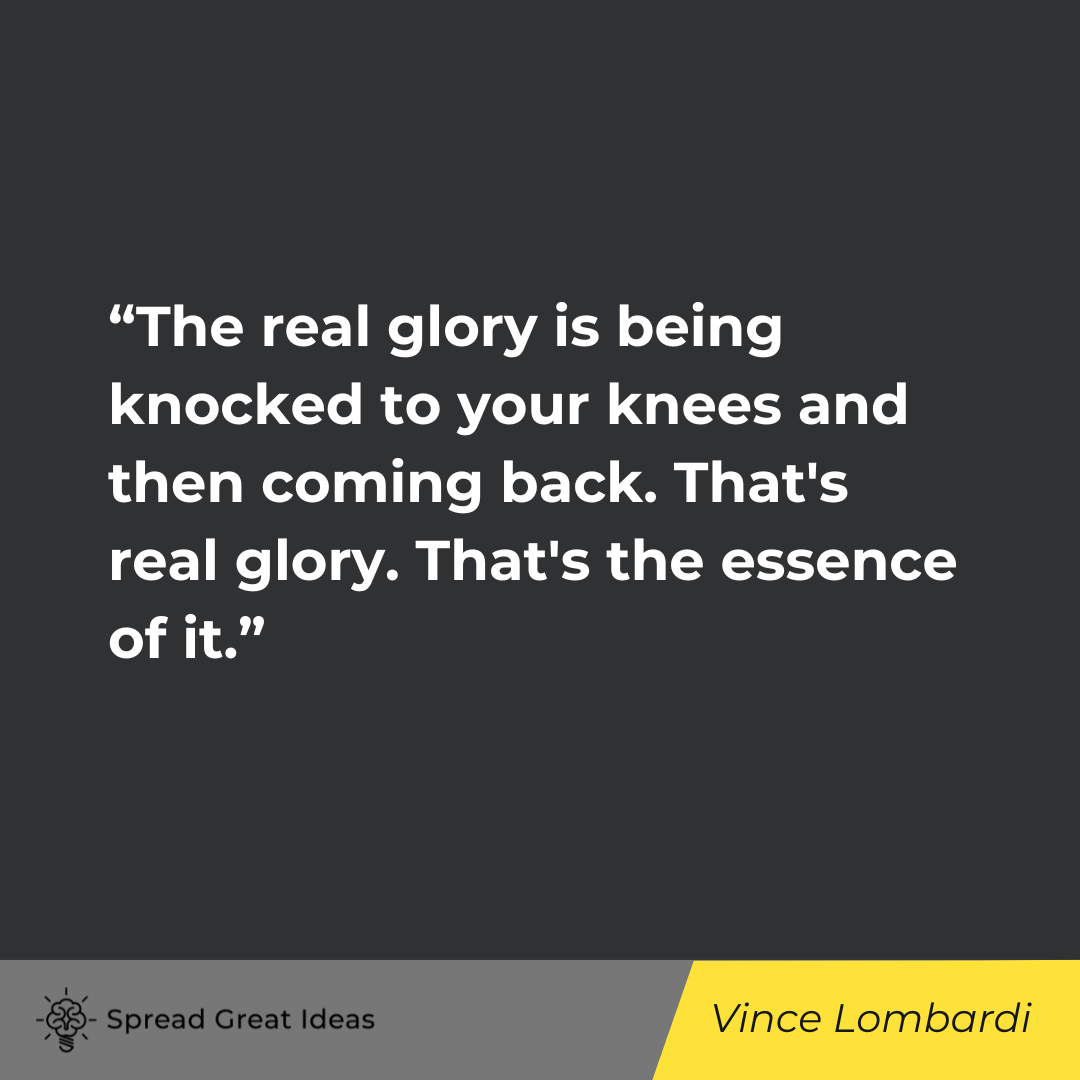
Vince Lombardi’s quote encapsulates the essence of resilience and triumph in the face of adversity. He emphasizes that true glory lies not in avoiding challenges, but in enduring setbacks and rising again. Lombardi suggests that the most profound victories are achieved through perseverance and determination, even when faced with overwhelming obstacles. By highlighting the transformative power of overcoming adversity, he inspires individuals to embrace the struggle as an opportunity for growth and self-discovery. Lombardi’s words remind us that true greatness is forged in the crucible of adversity, where resilience and determination shine brightest, defining the essence of real glory.
Arthur Miller
“My argument with so much of psychoanalysis, is the preconception that suffering is a mistake, or a sign of weakness, or a sign even of illness. When in fact, possibly the greatest truths we know, have come out of people’s suffering. The problem is not to undo suffering, or to wipe it off the face of the earth, but to make it inform our lives, instead of trying to ‘cure’ ourselves of it constantly, and avoid it, and avoid anything but that lobotomized sense of what they call ‘happiness.’ There’s too much of an attempt, it seems to me, to think in terms of controlling man, rather than freeing him—of defining him, rather than letting him go! It’s part of the whole ideology of this age, which is power-mad!“

Arthur Miller’s quote challenges the prevailing notion in psychoanalysis that suffering is inherently negative. He argues that suffering, far from being a mistake or weakness, often yields profound truths and insights. Miller advocates for embracing suffering as an integral part of the human experience, rather than constantly seeking to eradicate it. He criticizes society’s obsession with pursuing a superficial sense of happiness and control, arguing instead for a more nuanced understanding of human freedom and autonomy. Miller’s words resonate as a call to embrace the complexities of life, allowing suffering to shape and inform our journey rather than stifling it in pursuit of an unattainable ideal.
Alexis Carrel
“Man cannot remake himself without suffering, for he is both the marble and the sculptor.”
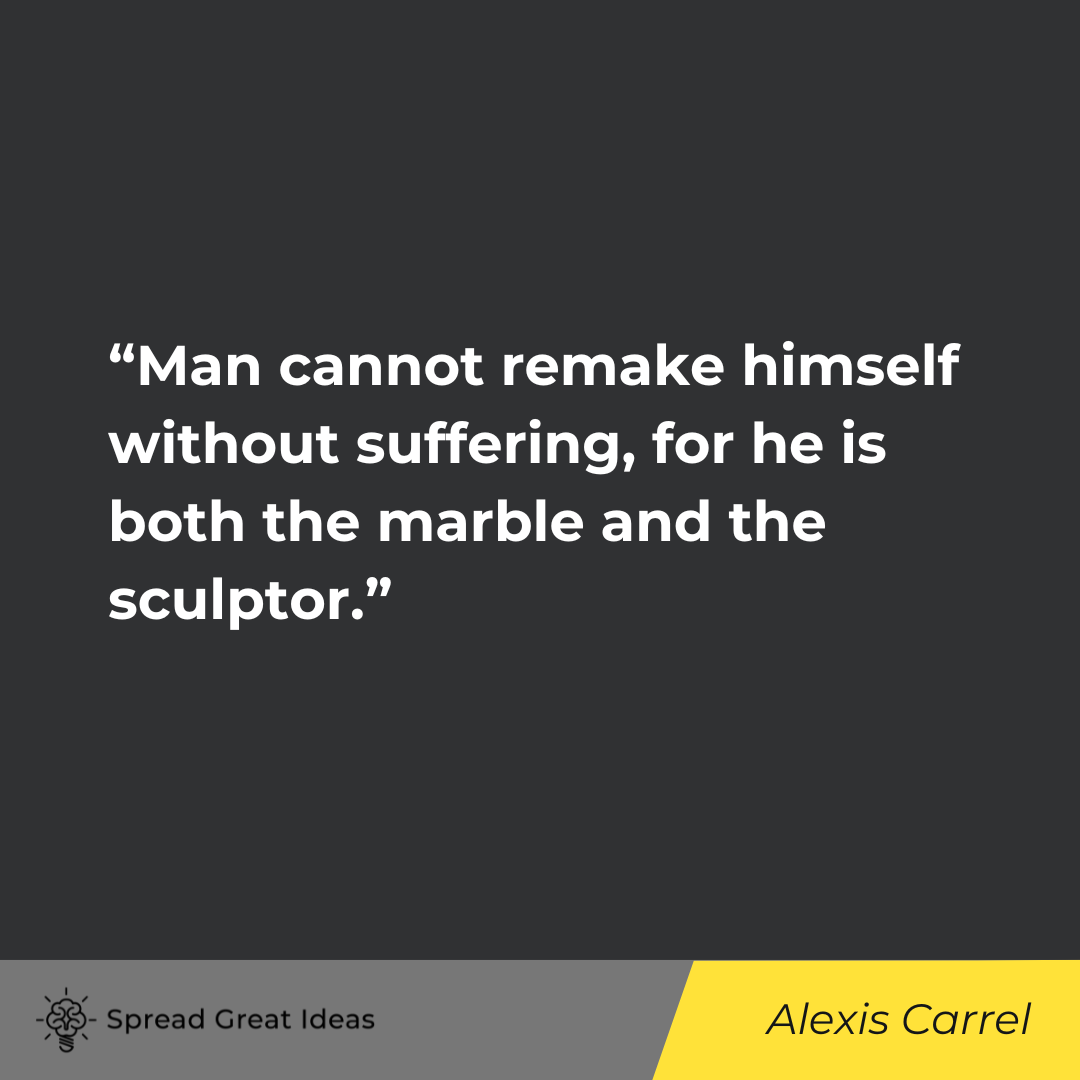
Alexis Carrel’s quote delves into the profound process of self-transformation, likening it to sculpting marble. He suggests that just as a sculptor must endure the laborious process of chiseling away at marble to craft a masterpiece, individuals must undergo suffering to remake themselves. Carrel underscores the inherent duality within each person, both the raw material and the artisan of their own destiny. Through this perspective, he highlights the necessity of pain and struggle in the journey of personal growth and evolution. Carrel’s words inspire reflection on the transformative power of suffering in shaping one’s character and destiny.
Unknown
“Out of your vulnerabilities will come your strength.“
– Unknown, often misattributed to Sigmund Freud

While commonly misattributed to Sigmund Freud, the quote “Out of your vulnerabilities will come your strength” encapsulates a profound truth about resilience and personal growth. It suggests that embracing one’s vulnerabilities, rather than shunning them, can lead to unexpected sources of inner strength. By acknowledging and confronting our weaknesses, we cultivate resilience, courage, and authenticity. This quote encourages individuals to view vulnerability not as a weakness, but as a gateway to empowerment and self-discovery. Through this lens, vulnerability becomes a catalyst for personal transformation, enabling individuals to tap into their deepest reserves of strength and resilience.
Napoleon Hill
“Helen Keller became deaf, dumb, and blind shortly after birth. Despite her greatest misfortune, she has written her name indelibly in the pages of the history of the great. Her entire life has served as evidence that no one is ever defeated until defeat has been accepted as reality.”
– Napoleon Hill, Think and Grow Rich
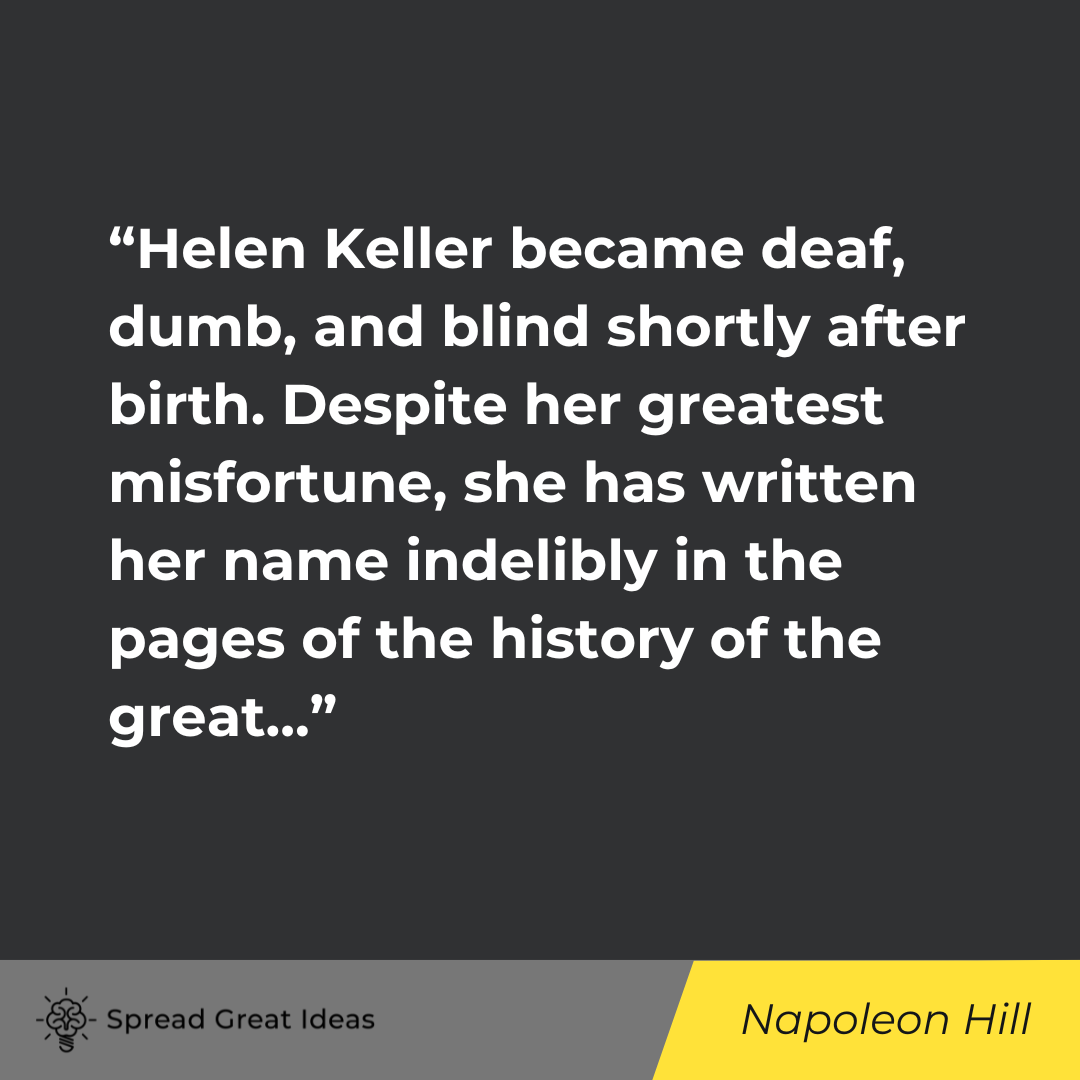
Napoleon Hill’s quote pays tribute to Helen Keller’s remarkable resilience and indomitable spirit in the face of profound adversity. Despite being deaf, dumb, and blind from infancy, Keller’s extraordinary achievements stand as a testament to the power of determination and perseverance. Hill highlights Keller’s life as a vivid illustration that true defeat only occurs when one surrenders to it. Keller’s story inspires individuals to overcome seemingly insurmountable obstacles and redefine their limitations. Through her example, Hill emphasizes the transformative potential of resilience, urging individuals to embrace challenges with unwavering resolve and to never allow defeat to dictate their destiny.
Winston Churchill
“Success is not final, failure is not fatal: it is the courage to continue that counts.“
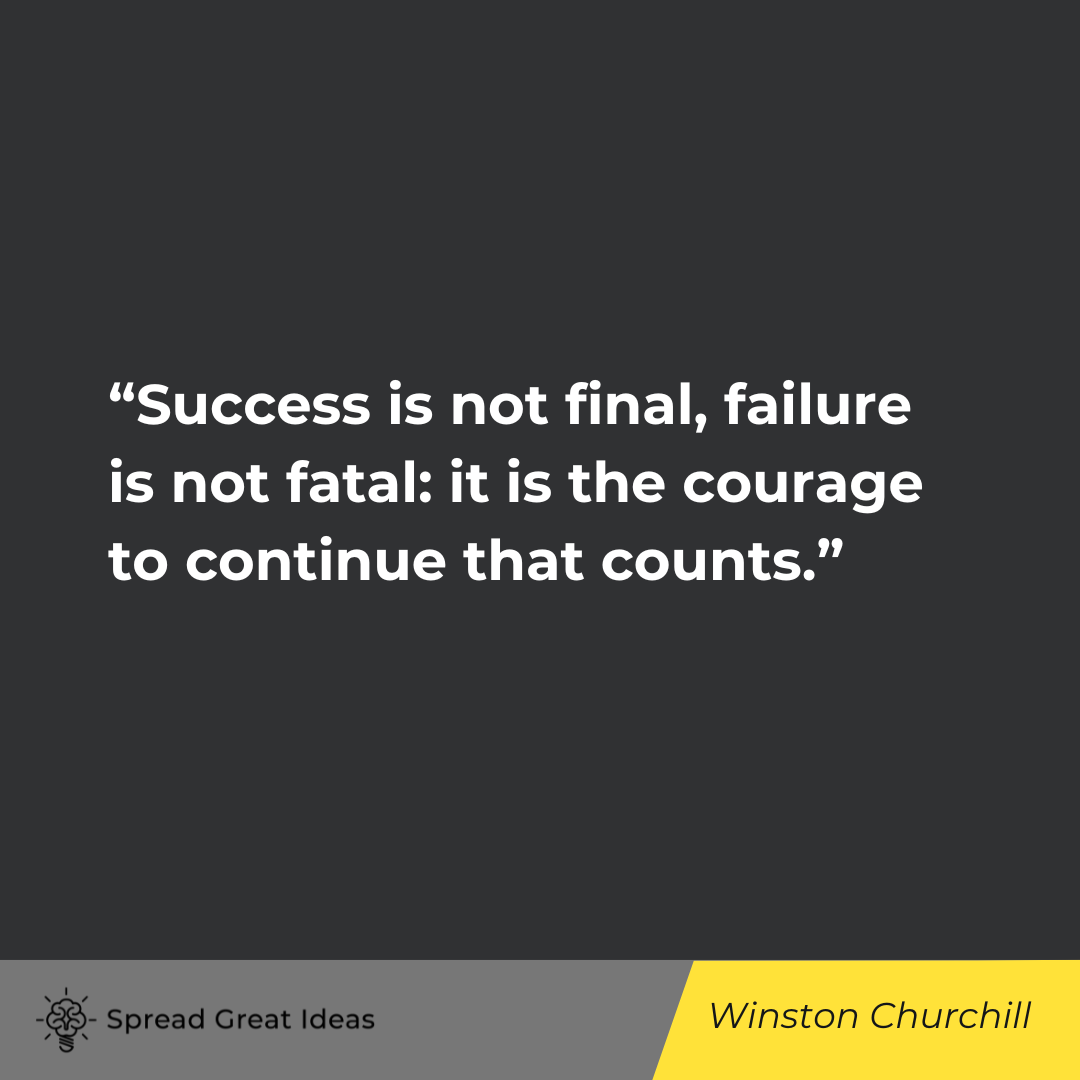
Winston Churchill’s timeless quote encapsulates the essence of resilience and perseverance in the face of success and failure. He challenges the notion that success or failure are definitive endpoints, suggesting instead that both are merely moments in the journey of life. Churchill emphasizes the importance of courage in persisting despite setbacks, highlighting that true strength lies in the ability to keep moving forward. Through this perspective, he inspires individuals to embrace a mindset of resilience and determination, recognizing that the courage to persevere in the face of adversity is the ultimate measure of success.
Winston Churchill
“Life can either be accepted or changed. If it is not accepted, it must be changed. If it cannot be changed, then it must be accepted.“
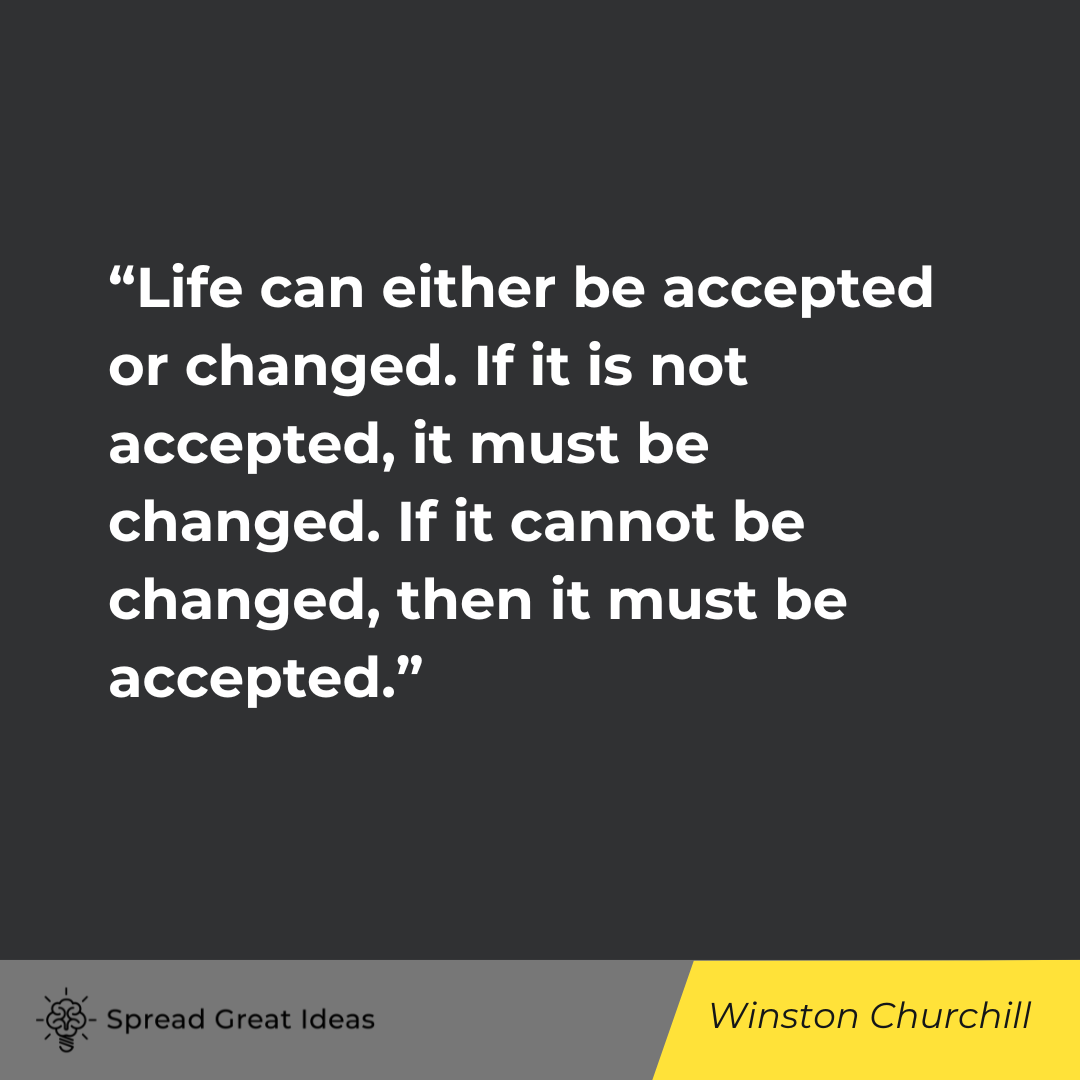
Winston Churchill’s quote encapsulates a profound perspective on navigating life’s challenges. He presents a binary choice: accept life as it is or take action to change it. Churchill recognizes that some aspects of life are beyond our control, necessitating acceptance. However, he also acknowledges the power of agency in effecting change where possible. This quote serves as a guiding principle, urging individuals to discern between what can be altered and what must be embraced. Through Churchill’s wisdom, we’re encouraged to cultivate resilience, adaptability, and the courage to confront adversity or find peace in acceptance when change is elusive.
Theodore Roosevelt
“It is not the critic who counts; not the man who points out how the strong man stumbles, or where the doer of deeds could have done them better. The credit belongs to the man who is actually in the arena, whose face is marred by dust and sweat and blood; who strives valiantly; who errs, who comes short again and again, because there is no effort without error and shortcoming; but who does actually strive to do the deeds; who knows great enthusiasms, the great devotions; who spends himself in a worthy cause; who at the best knows in the end the triumph of high achievement, and who at the worst, if he fails, at least fails while daring greatly, so that his place shall never be with those cold and timid souls who neither know victory nor defeat.“
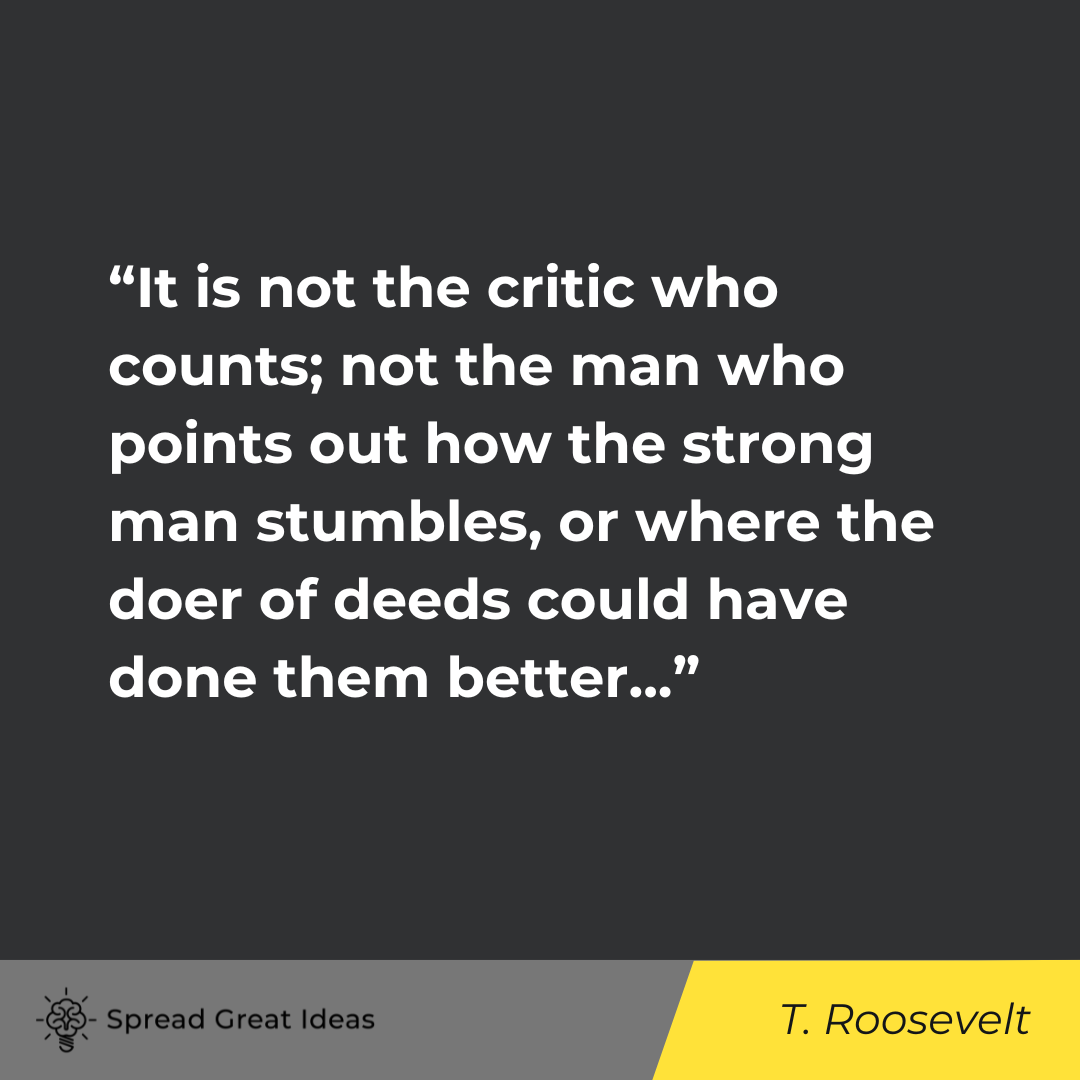
Theodore Roosevelt’s powerful quote extols the virtue of courage and resilience in the face of criticism and adversity. He emphasizes the importance of taking action and being actively engaged in the arena of life, rather than merely observing from the sidelines. Roosevelt celebrates those who dare greatly, acknowledging that true achievement often comes with the risk of failure. He praises individuals who persevere despite setbacks, recognizing their dedication and commitment to noble causes. Through his words, Roosevelt inspires us to embrace challenges with courage and determination, reminding us that it is better to strive valiantly and fail than to never have tried at all.
Alain de Botton
“We seem to live in a culture where failure isn’t spoken of. It’s as if there are these failures, and that’s just this sort of freakish thing that happens to a few people and let’s not talk about them. And then there’s success. But somehow they’re brought together. Instead what’s interesting to think is what Nietzsche talked about; In every life, every successful life, there’s going to be some failure at some level. Not necessarily a huge level—but at some level. Nietzsche didn’t think that having failed was in itself enough. All lives have failures in them. What makes some lives fulfilled is the manner in which failure has been met.“
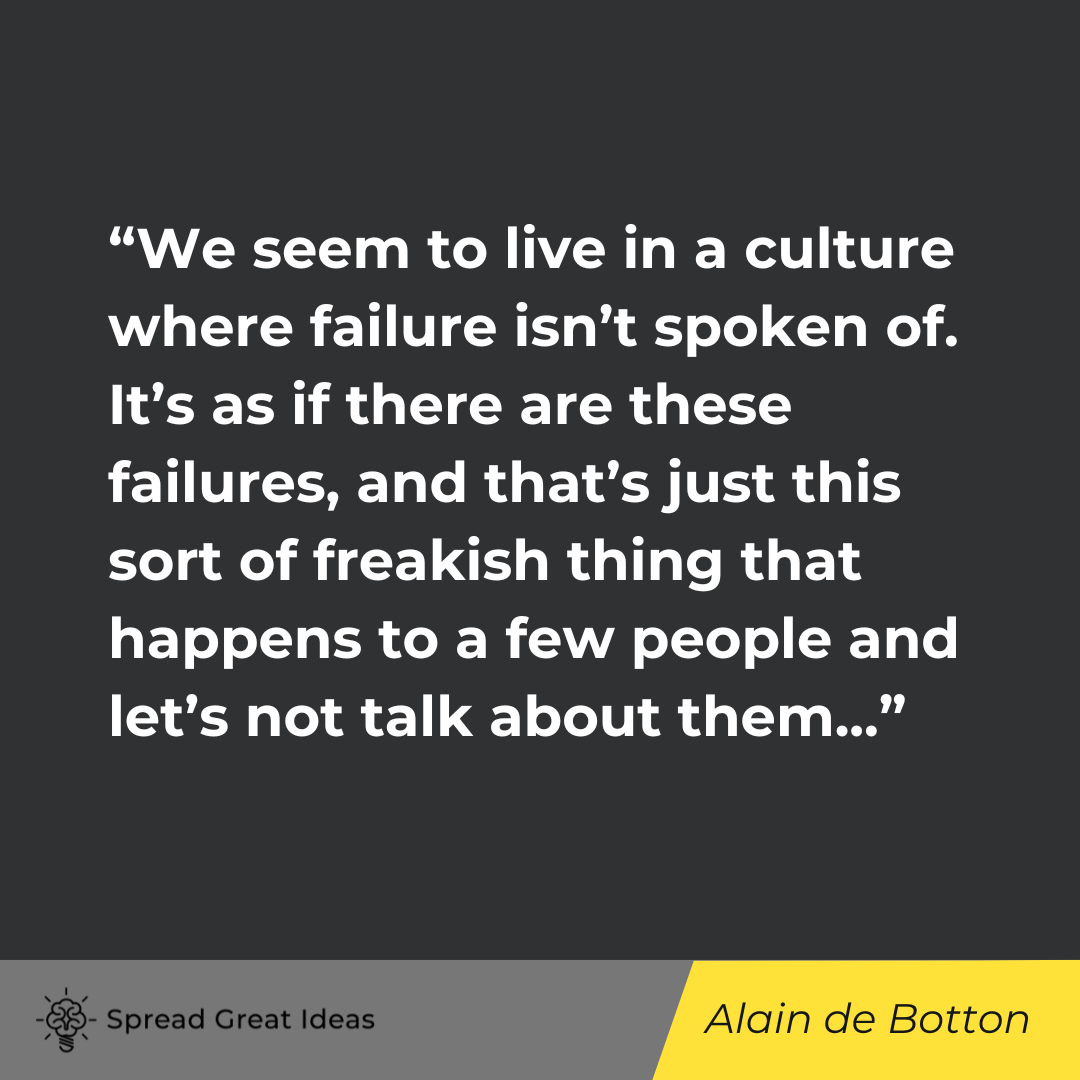
Alain de Botton’s insightful quote delves into the cultural reluctance to discuss failure and the inherent connection between failure and success. He suggests that failure is often treated as a taboo topic, overshadowed by society’s fixation on success. Drawing from Nietzsche’s philosophy, de Botton argues that failure is an inevitable part of every life, regardless of the degree. However, he emphasizes that it is not the failure itself but rather how it is confronted and overcome that shapes the fulfillment of one’s life. Through this perspective, de Botton encourages a more nuanced understanding of success and failure, highlighting the importance of resilience and growth in navigating life’s challenges.
John Keats
“Do you not see how necessary a World of Pains and troubles is to school an Intelligence and make it a soul?”
– John Keats, Letters of John Keats
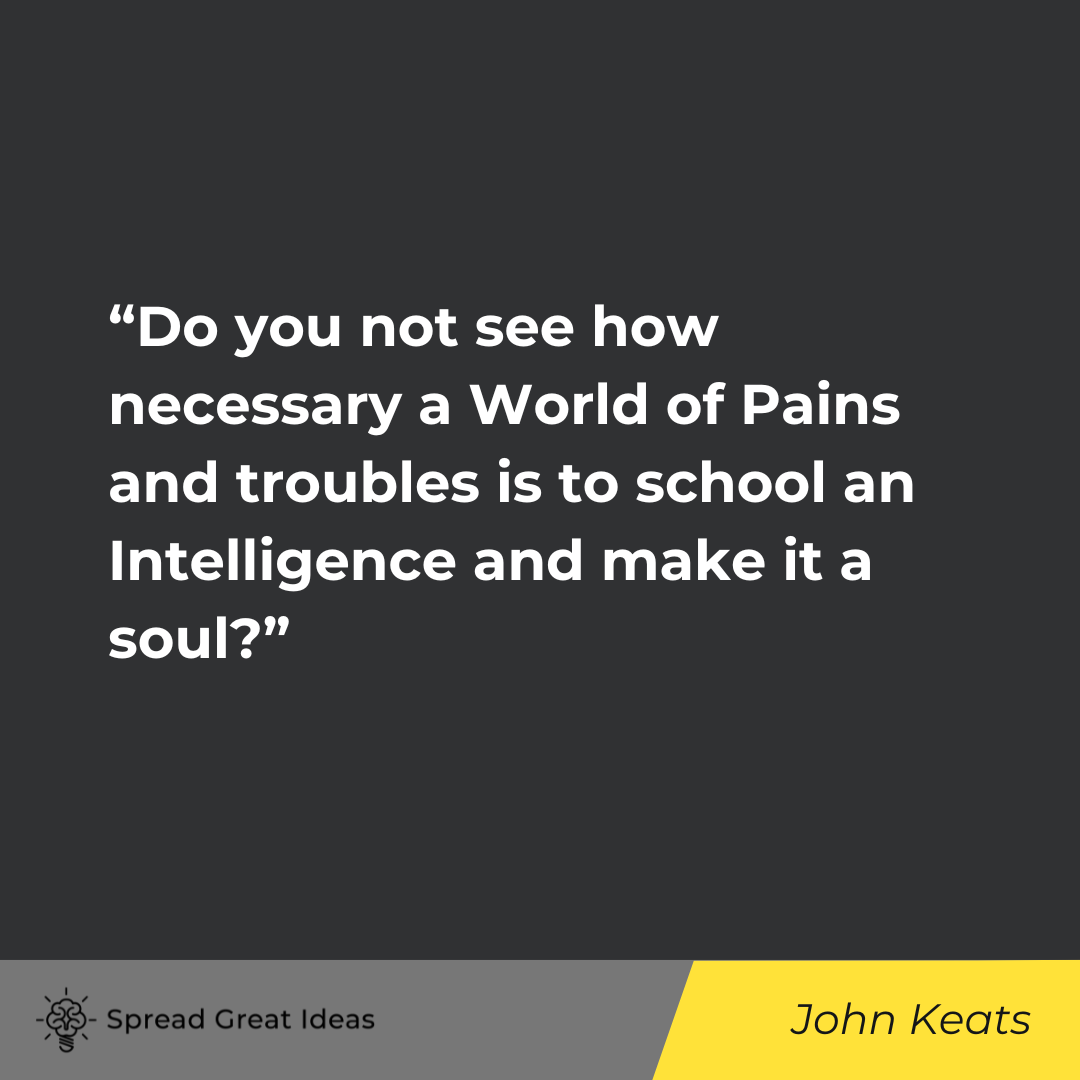
In this profound excerpt from his letters, John Keats reflects on the transformative power of adversity in shaping the human experience. He suggests that the trials and tribulations we face in life are not mere hardships, but essential components in the development of our intellect and spirit. Keats implies that it is through navigating pain and struggles that we cultivate wisdom, empathy, and resilience, ultimately evolving from mere intelligence into fully realized souls. This quote invites us to embrace the challenges of life as opportunities for growth and self-discovery, recognizing the profound lessons they offer on our journey toward fulfillment and enlightenment.
Johnny Cash
“It’s good to know who hates you, and it’s good to be hated by the right people.“

Johnny Cash’s quote captures a unique perspective on criticism and adversity. He suggests that there can be value in knowing who dislikes you, particularly if those individuals are ones with whom you would not want to associate or whose values diverge from your own. Cash implies that being disliked by certain people can serve as validation of staying true to one’s beliefs and principles. By aligning oneself with the right values, being disliked by those who oppose them can be seen as a mark of integrity and authenticity. This quote encourages individuals to prioritize self-respect over seeking universal approval.
Albert Camus
“In the depth of winter, I finally learned that within me there lay an invincible summer.”

Albert Camus’ poignant quote beautifully encapsulates the resilience of the human spirit. Through the metaphor of winter and summer, Camus illustrates the transformative power of self-discovery amidst adversity. Despite the harshness of winter, he unveils the realization that within himself lies an enduring source of warmth and strength—an invincible summer. This quote speaks to the innate capacity within each individual to find resilience and hope even in the darkest of times. It inspires us to tap into our inner reservoirs of courage and perseverance, recognizing that amidst life’s challenges, our inner light can shine brightly, guiding us through the coldest of winters.
Thomas A. Edison
“I have not failed. I’ve just found 10,000 ways that won’t work.”
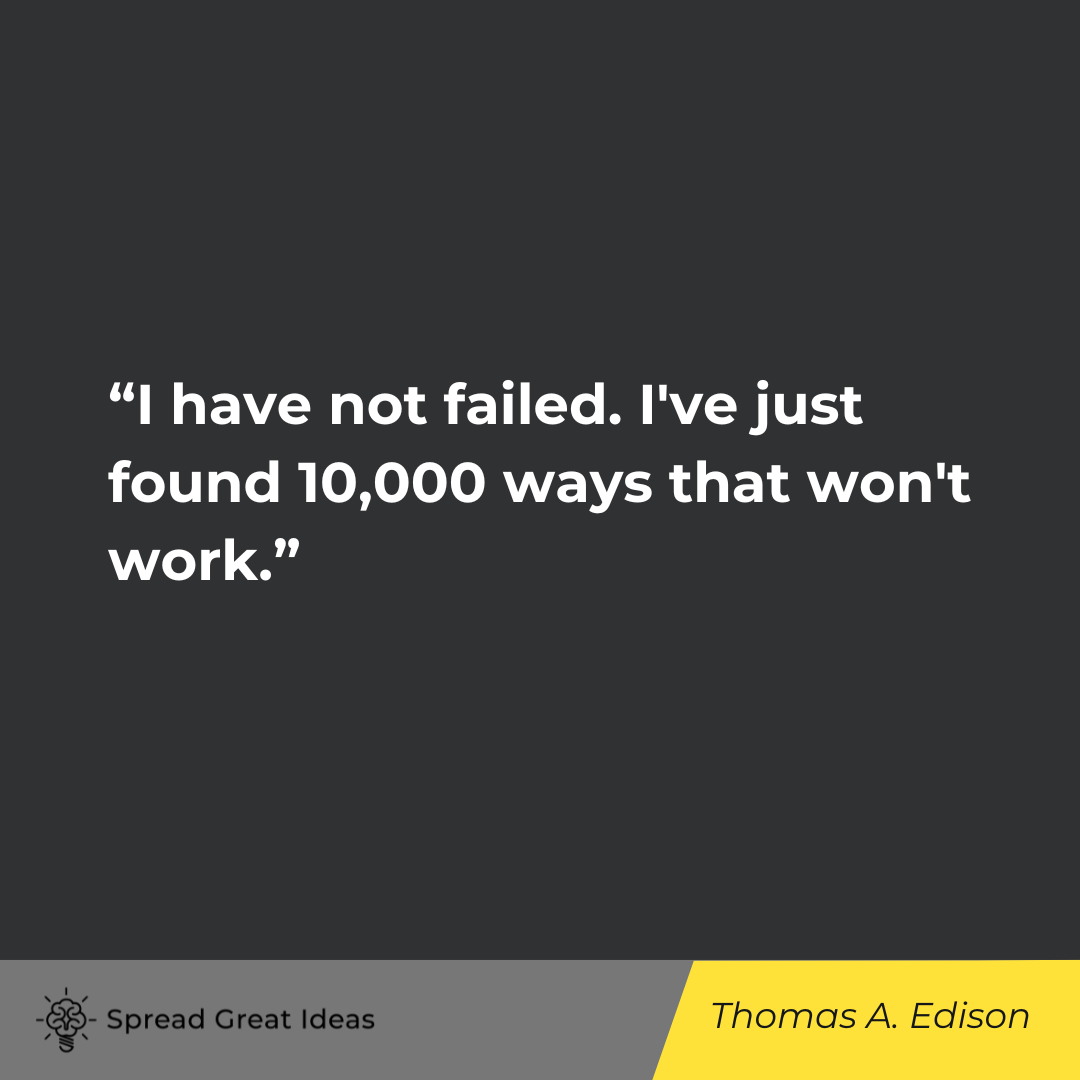
Thomas A. Edison’s quote exemplifies a resilient attitude towards failure and experimentation. Rather than viewing setbacks as definitive failures, Edison reframes them as valuable lessons in the pursuit of success. He highlights the importance of perseverance and adaptability in the face of adversity, demonstrating a mindset focused on learning and growth. By embracing failure as an integral part of the creative process, Edison exemplifies resilience and determination. His words inspire individuals to adopt a positive outlook towards challenges, recognizing that each setback brings them one step closer to discovering innovative solutions and achieving their goals.
